Transport
Summit 2025
HIGHLIGHTS IN PICTURES


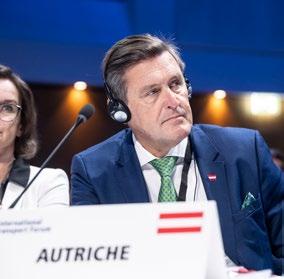
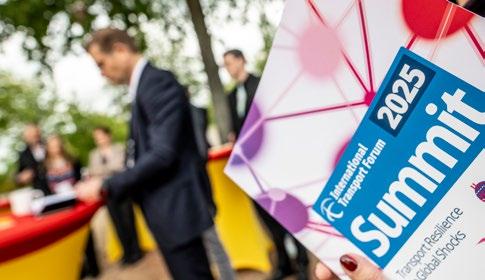



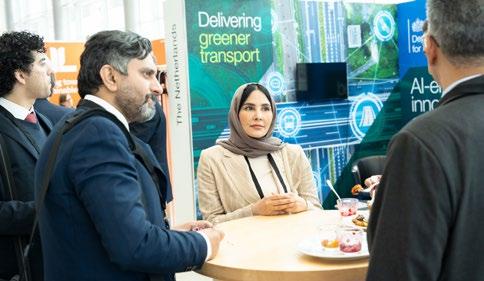










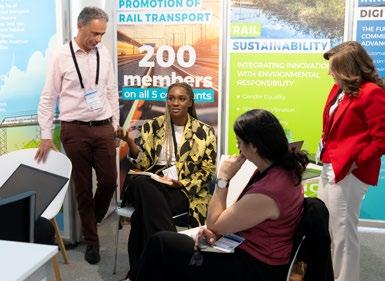

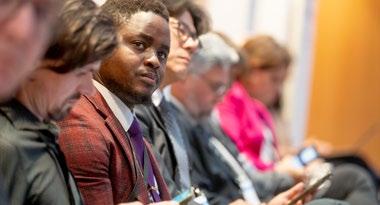



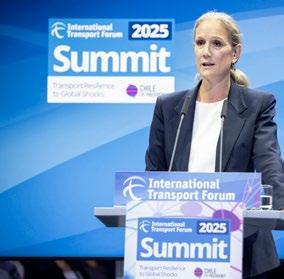

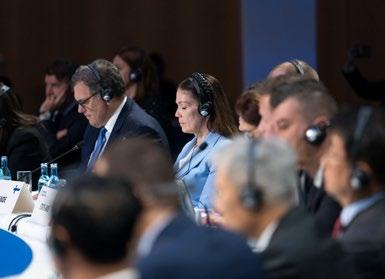

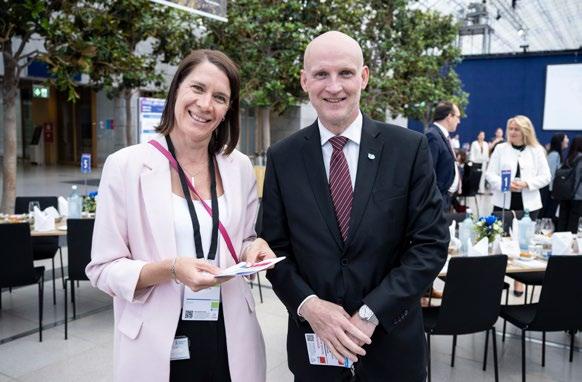

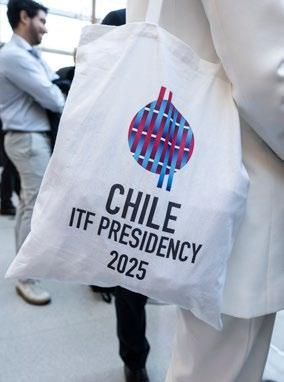
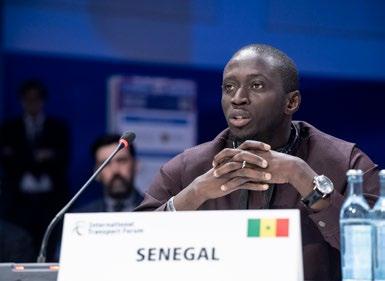


The 2025 Summit in Retrospect
Debates and Decisions
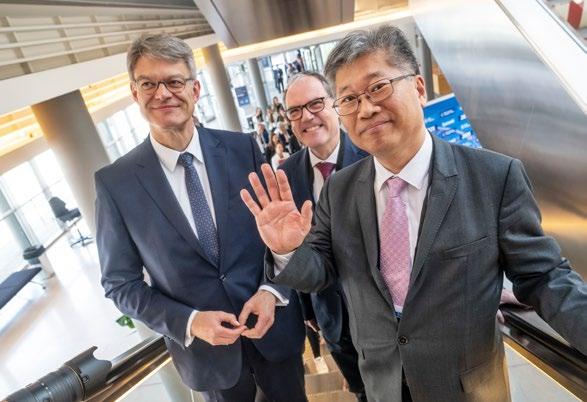
Capturing the full scope of an event as dynamic as the 2025 Summit is no easy task. The programme provides structure and focus, but so much value lies in the moments that unfold around it. An unexpected insight at a roundtable discussion. A recurring theme that surfaces across sessions. A casual conversation between participants that turns into a lasting collaboration.
This brochure brings together visual highlights from the International Transport Forum’s 2025 Summit, held from 21 to 23 May in Leipzig, Germany, on the theme ““Transport Resilience to Global Shocks Resilience”. It presents a visual record of high-level meetings and
casual encounters, lively debates and live demonstrations, and, most important of all: the people who made them happen—ministers, leaders, experts, and all the partners working with the ITF to help shape the future of transport.
The Summit took important steps to do exactly that. ITF’s highest decision-making body, the Council of Ministers of Transport, approved landmark policy recommendations. The first ITF Policy Recommendation provides governments with guidance for the responsible use of artificial intelligence in transport. The second Recommendation sets out principles for road safety policies that are effective in saving lives. You can read more about them on pages 46-47.
As tangible outcomes of the 2025 Summit, these documents give direction to global transport governance on critical issues. They are the result of tireless collaboration among our member countries and reflect both the seriousness of our mission and the vitality of our collaboration.
The strength of the ITF Summit lies in its diversity. We were honoured to welcome delegations from over 70 nations. More than 40 Ministers and Vice-Ministers attended the ITF Summit in 2025. International organisations, the multilateral development banks, private-
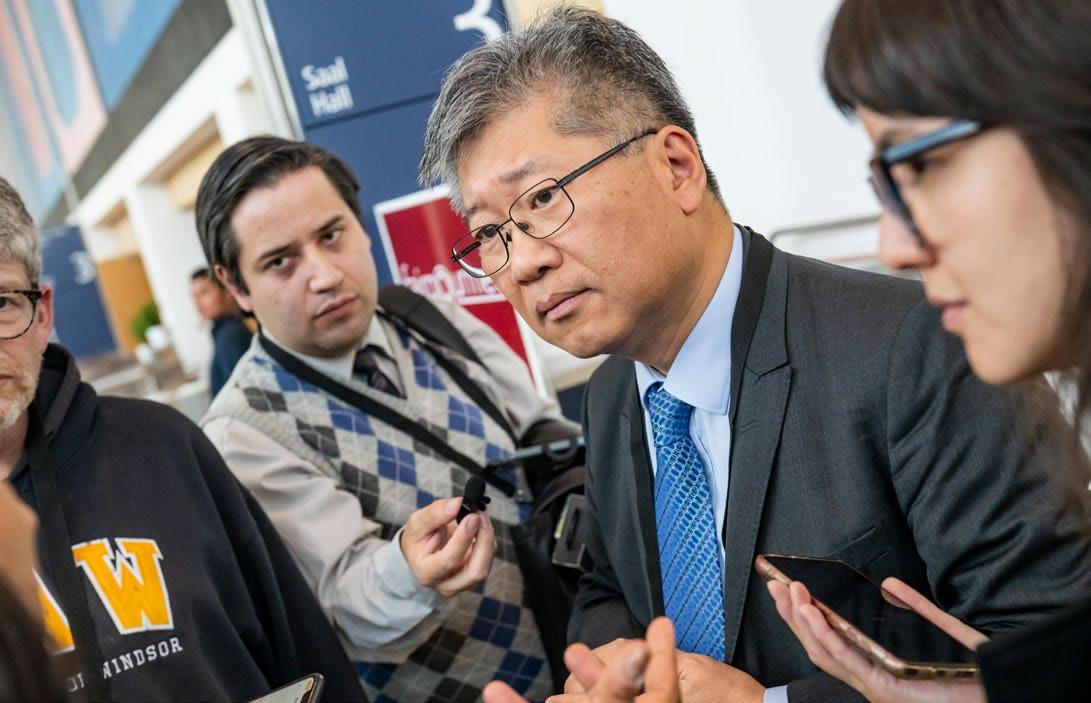
sector partners and academic thought leaders added critical depth and nuance. The presence of around 70 media representatives from around the world ensured our discussions found an echo far beyond the conference centre walls.
I wish to express my profound gratitude to the Republic of Chile, which held the Presidency of the ITF in 2024/25, for leading our organisation in such an exemplary fashion. The calm clarity of Minister Juan Carlos Muñoz piloted the Forum through a year in which resilience was a critical quality for governance as much as for transport systems. I look forward to collaborating with Azerbaijan as it takes on the ITF Presidency for 2025/26. Its proven track record in multilateral affairs gives me full confidence that the ITF is in capable hands.
A sincere thank you also goes to our partners and sponsors for making the 2025 Summit thrive: the Free State of Saxony, the International Road Transport Union (IRU), EIT Urban Mobility, Dekra, EU Rail and Nextbike.
Preparing transport systems for the challenges of increasing uncertainty and growing risks is a huge task. I left Leipzig with the sense that this Summit made a powerful step forward towards progress in transport resilience. But we all know it will not happen overnight, which is why 2025 was the first in a trilogy on the subject.
Our journey continues next year from 6 to 8 May 2026, when the theme is “Funding Resilient Transport.” Until then, I invite you to revisit the people, moments, and outcomes of the 2025 Summit in the pages that follow—and to carry its ideas into the work ahead.
Young Tae Kim Secretary-General

Ministers

Ministers with responsibility for transport from the 69 ITF member countries - and beyond discuss ways to make transport systems more resilient in the face of global shocks.
Les ministres des transports des 69 pays membres du FIT discutent des moyens de rendre les systèmes de transport plus résilients face aux chocs mondiaux.
Resilience is a choice. It’s the policies we launch, the investments we make, and the partnerships we build.


Finland’s Minister Lulu
La ministre finlandaise Lulu Ranne s’entretient avec le ministre suédois Andreas Carlson.
Juan
Carlos Muñoz Minister of Transport and Telecommunications, Chile
◀ Chile’s Minister Juan Carlos Munoz opens the Summit 2025 as representative of the ITF Presidency country.
Le ministre chilien Juan Carlos Muñoz ouvre le Sommet 2025 en tant que représentant du pays assurant la présidence du FIT.
▼ Germany’s Federal Minister of Transport Patrick Schnieder with ITF Secretary General Young Tae Kim.
Patrick Schnieder, ministre fédéral des Transports de l’Allemagne, avec le secrétaire général Young Tae Kim du FIT.

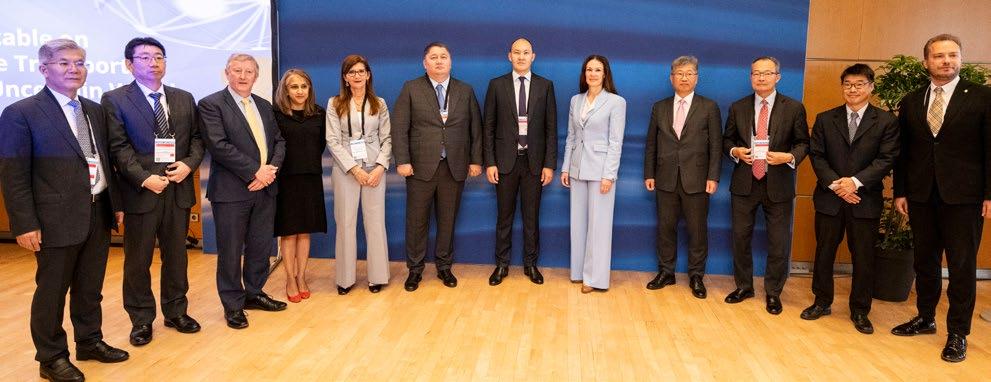
▲ Participants pose for a group photo ahead of the Ministers’ Roundtable on maritime transport resilience.
Les participants posent pour une photo de groupe avant la table ronde ministérielle sur la résilience du transport maritime.

◀ Philippe Tabarot, the French Minister in charge of Transport intervenes during the Open Ministerial.
Philippe Tabarot, ministre français chargé des Transports, intervient lors de la réunion ministérielle publique.
▶ Ghana’s Minister of Transport, Joseph Bukari Nikpe, speaks during the Ministerial session.
Le ministre ghanéen des Transports, Joseph Bukari Nikpe, s’exprime lors de la séance ministérielle.”
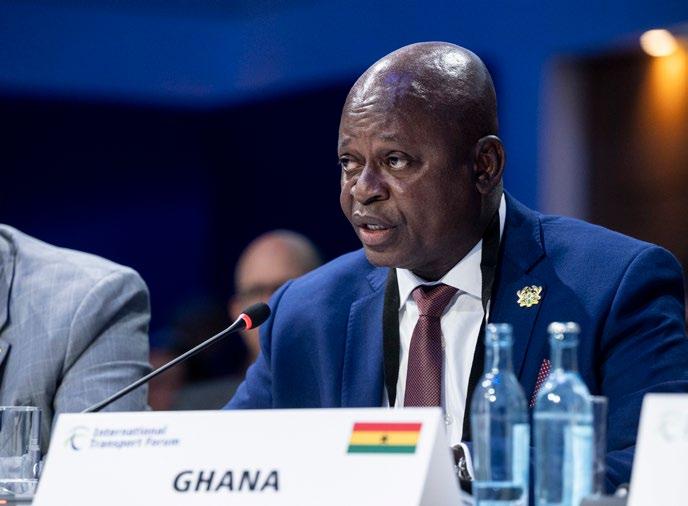

◀ Morocco’s Minister Abdessamad Kayouh raises his flag during the session of the Council of Ministers of Transport.
Le ministre marocain Abdessamad Kayouh signale son intention de prendre la parole lors de la session du Conseil des ministres des transports.
▶ The Ministers’ Roundtable on Transport and Climate Change discusses ways forward in preparation for COP30 in Brazil.
La table ronde des ministres sur les transports et le changement climatique discute des moyens de progresser dans la préparation de la COP30 au Brésil.
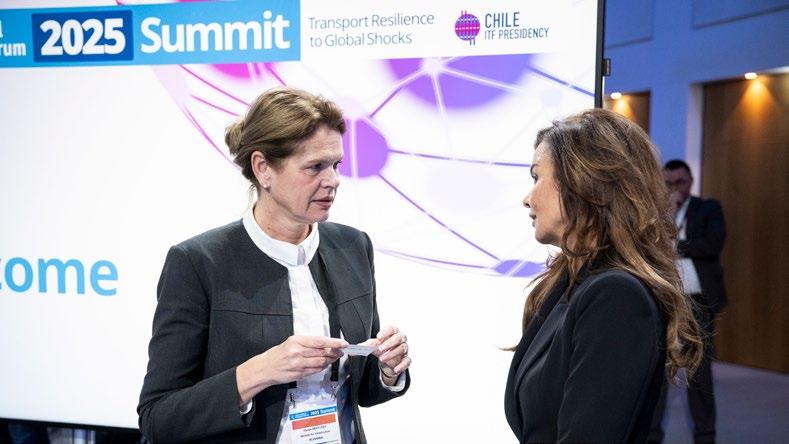

◀ Slovenia’s Minister of Infrastructure, Alenka Bratušek in conversation with Slovak State Secretary Denisa Žiláková.
Alenka Bratušek ministre slovène des Infrastructures, en conversation avec le secrétaire d’État slovaque Denisa Žiláková.
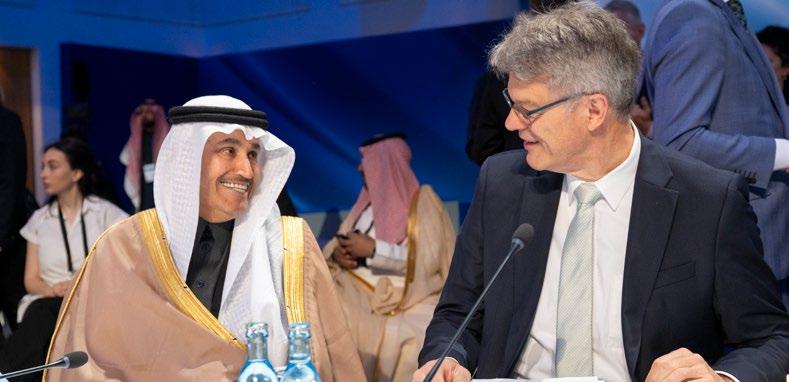
◀ Saudi Minister Saleh Al-Jasser (on the left) and German Minister Patrick Schnieder prepare for the Open Ministerial.
Le ministre saoudien Saleh Al-Jasser (à gauche) et le ministre allemand Patrick Schnieder se préparent à la réunion ministérielle publique.
▶ Chile’s Minister of Transport and Telecommunications, Juan Carlos Muñoz, chairs the Council of Ministers of Transport.
Le ministre chilien des Transports et des Télécommunications, Juan Carlos Muñoz, préside le Conseil des ministres des transports.
▶ Serhiy Derkach, Ukraine’s Deputy Minister for the Development of Communities and Territories, speaks during the Executive Workshop to co-ordinate Ukraine’s transport recovery.
Serhiy Derkach, vice-ministre ukrainien du Développement des communautés et des territoires, s’exprime lors de l’atelier exécutif visant à coordonner la reprise des transports en Ukraine.

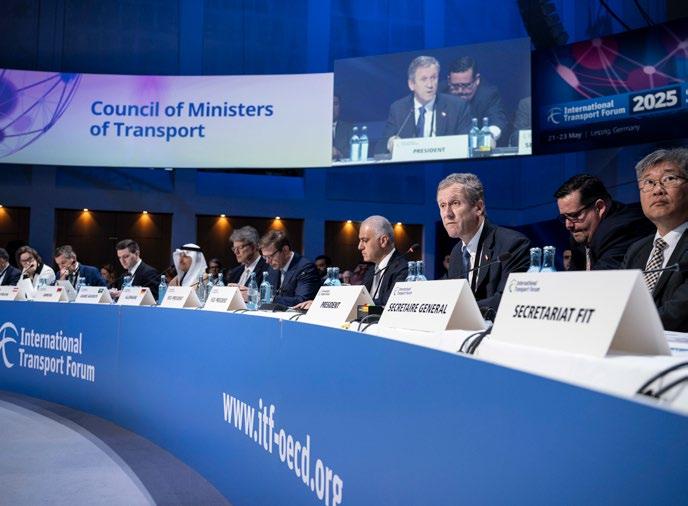
Debate

The Open Ministerial focused on ways to align efforts for enhanced resilience across the public and private sectors.
La réunion ministérielle publique s’est concentrée sur les moyens d’aligner les efforts pour améliorer la résilience dans les secteurs public et privé.
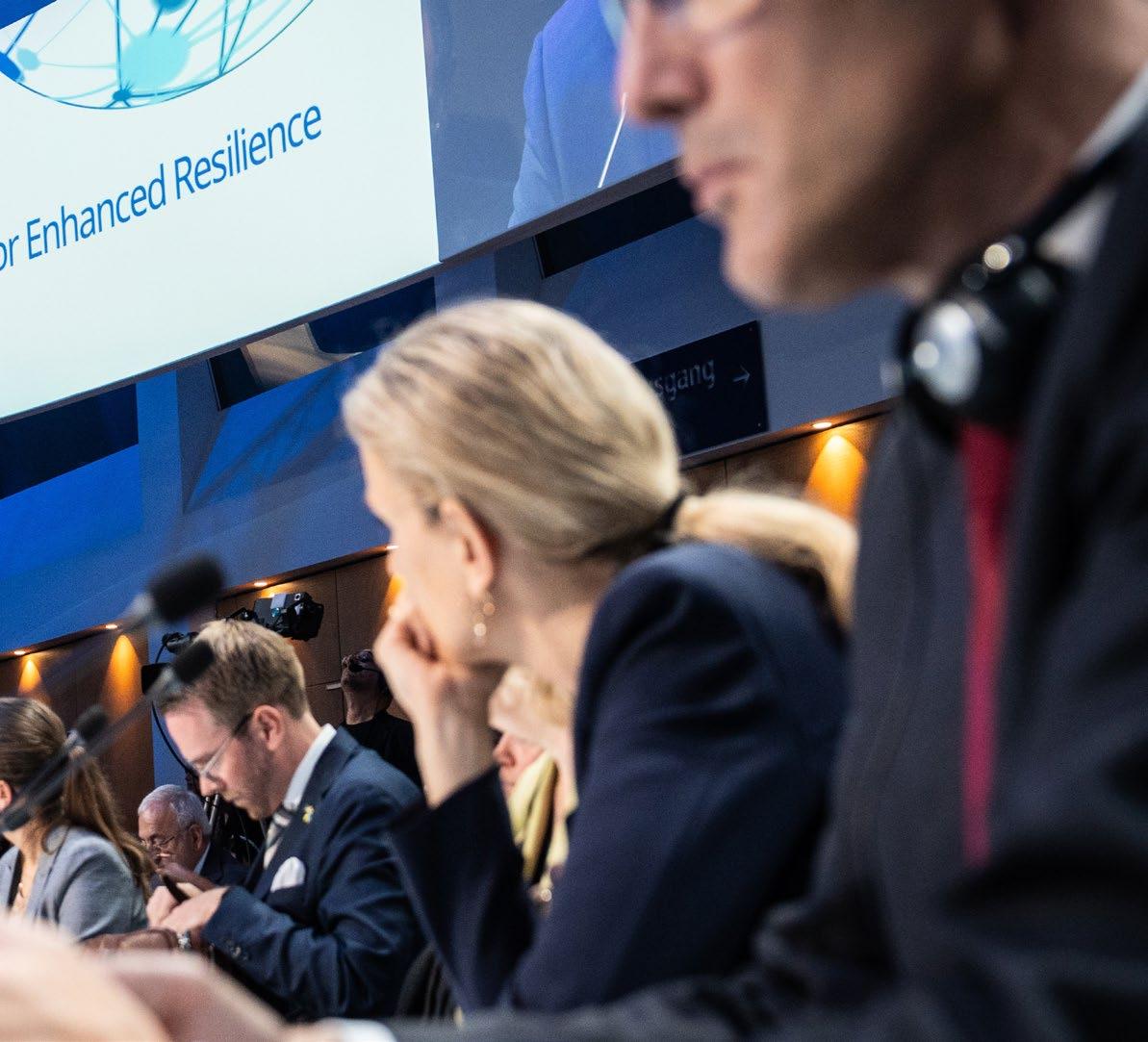
Crises don’t know borders. Robust domestic policies alone won’t make a country safe in case of a global shock.
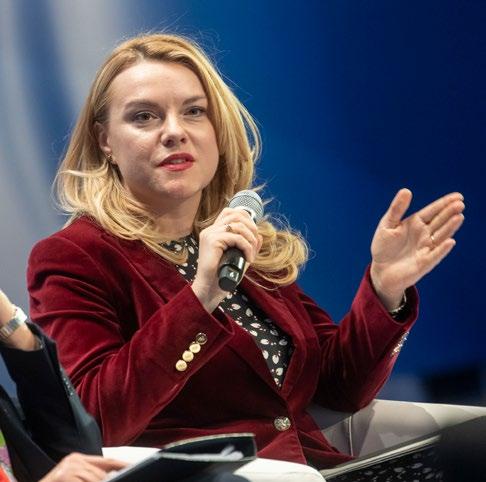
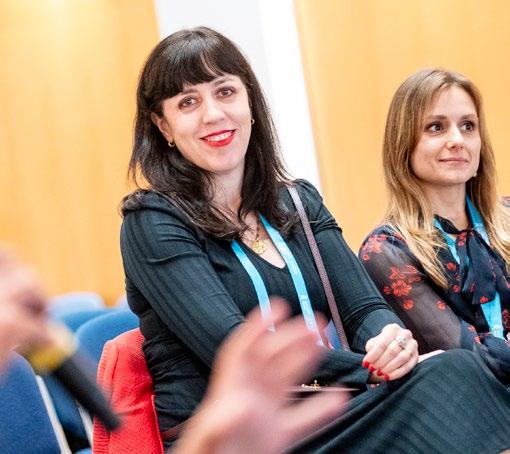
Tatiana Molcean
Executive Secretary, United Nations Economic Commission for Europe (UNECE)
◀ Tatiana Molcean, Executive Secretary of the United Nations Economic Commission for Europe (UNECE), makes a point during the Opening Plenary.
Tatiana Molcean, secrétaire exécutive de la Commission économique des Nations unies pour l’Europe (CEE-ONU), s’exprime lors de la séance plénière d’ouverture.
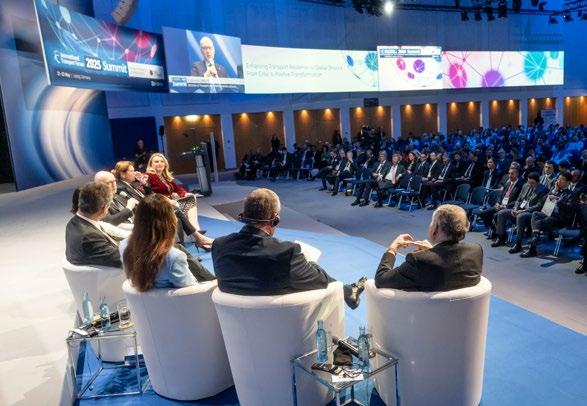
▲ Ministers and Heads of International Organisations on stage during the Opening Plenary.
Ministres et chefs d’organisations internationales sur scène lors de la séance plénière d’ouverture.

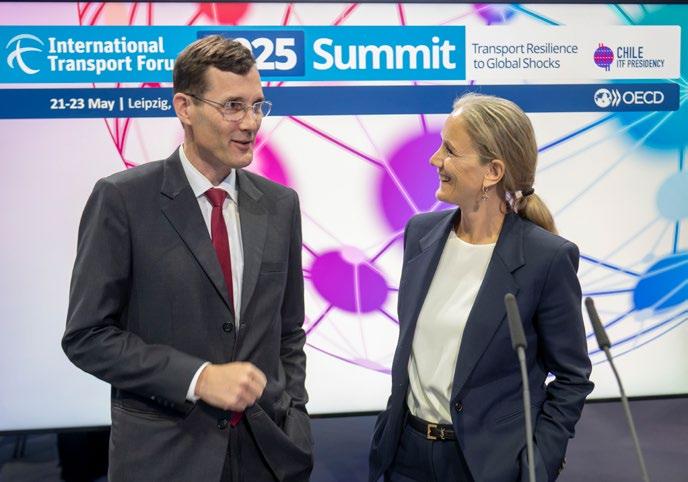
◀ Keynotes by Tobias Meyer, CEO of DHL Group (left), and Machteld de Haan, President Downstream, Renewables and Energy Solutions at Shell, kicked off the debate at the Open Ministerial.
Les discours de Tobias Meyer, PDG du groupe DHL (à gauche), et de Machteld de Haan, président des solutions avals, renouvelables et énergétiques de Shell, ont donné le coup d’envoi au débat lors de la réunion ministérielle publique.
La Banque mondiale a organisé un événement parallèle sur le corridor médian.


◀ Nannette LafondDufour, President of the Women’s Forum for the Economy and Society, speaks about workforce resilience.
Nannette Lafond-Dufour, présidente du Women’s Forum for the Economy and Society, s’exprime sur la résilience de la maind’œuvre lors de la séance plénière du deuxième jour .
Secretary-General Young Tae Kim presented the ITF Awards 2025 in a special ceremony. The ITF Journalism Award went to Sol Suárez for her hourlong TV feature on Colombia’s transport system. Felipe Bedoya received the ITF Young Researcher of the Year Award for his case study on the prevention of supply chain disruptions.
Le secrétaire général Young Tae Kim a remis les prix FIT 2025 lors d’une cérémonie spéciale. Le prix du journalisme du FIT a été décerné à Sol Suárez pour son reportage télévisé d’une heure sur le système de transport colombien. Felipe Bedoya a reçu le prix du jeune chercheur de l’année du FIT pour son étude de cas sur la prévention des perturbations de la chaîne d’approvisionnement.
The ITF Awards


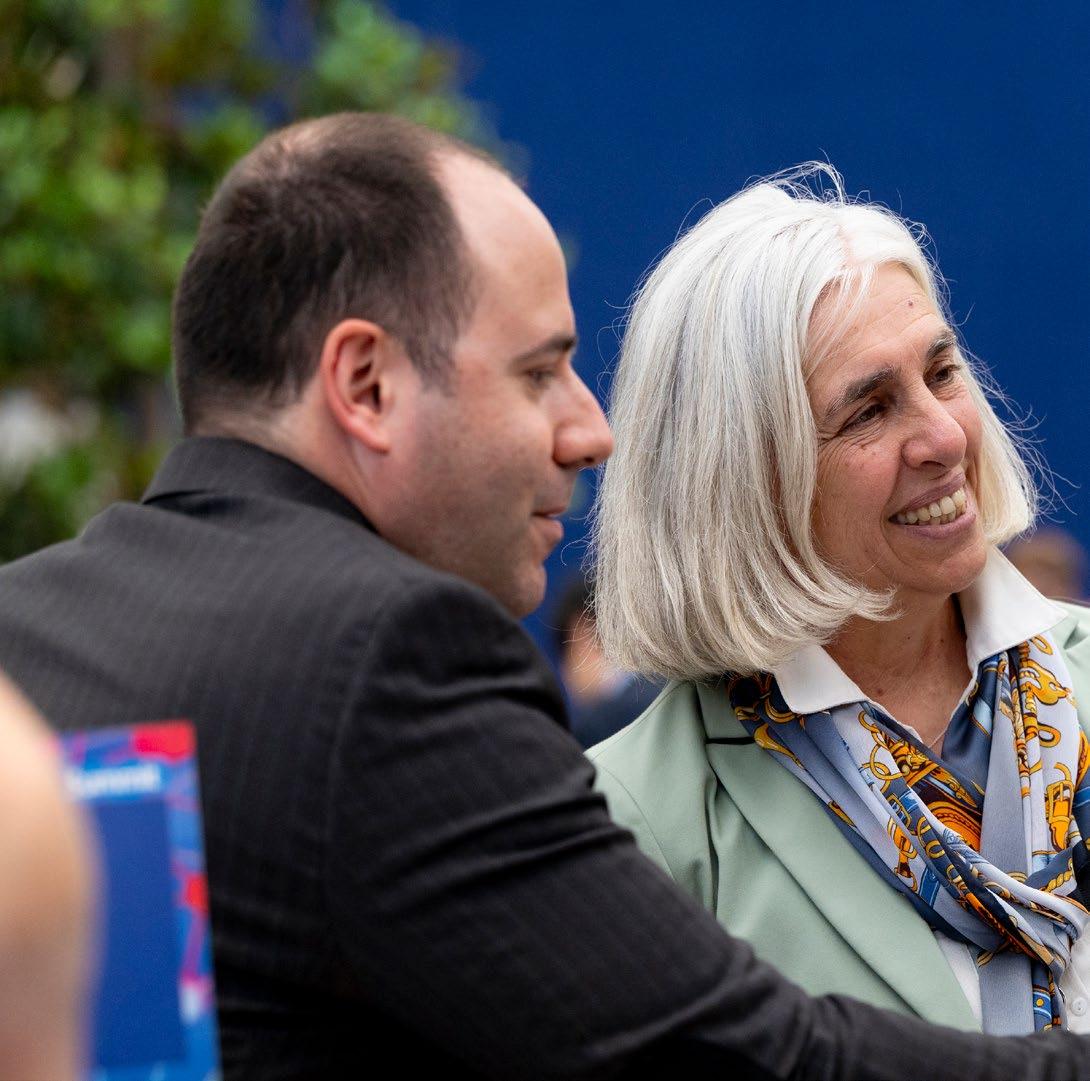
Networking
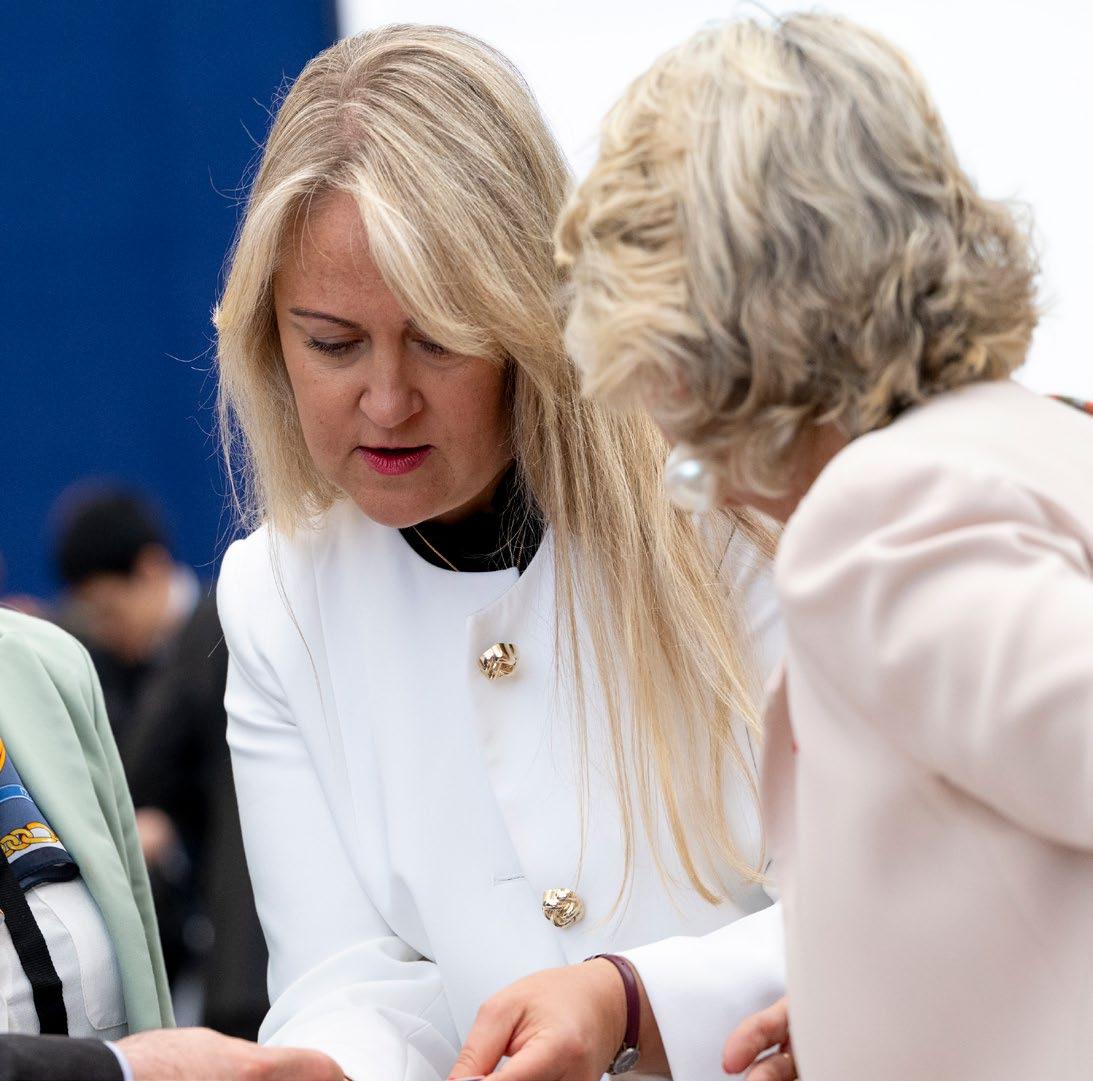
Summit participants connect during the Gala Dinner on Day 2 of the Summit.
Les participants au Sommet se rencontrent lors du dîner de gala du deuxième jour du Sommet.
The challenge of decarbonisation is immense. The public and private sector must tackle it together.
▶ Sara Elkady, Senior Vice-President Strategy, Digitalisation and Tech of ITF Corporate Partner Siemens Mobility, greets UITP Senior Director Strategy and Transformation Sylvain Haon.
Sara Elkady, Senior Vice President Strategy, Digitalisation and Tech de Siemens Mobility, partenaire du FIT, salue Sylvain Haon, Senior Director Strategy and Transformation de l’UITP.
Mallika Ishwaran Chief Economist, Shell
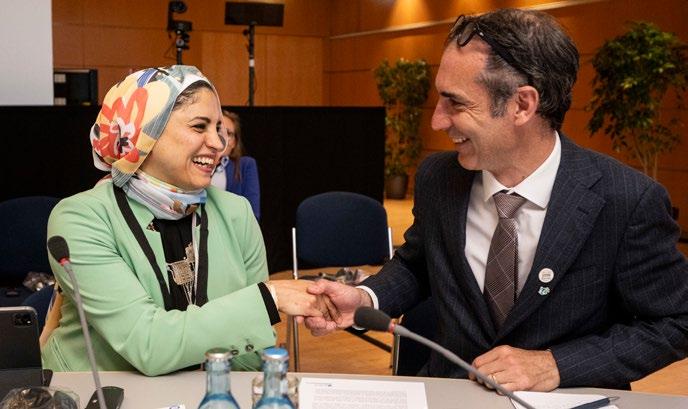

▶ Ukraine’s Deputy Minister Serhiy Derkach in conversation with Yoshimichi Terada, ViceMinister for International Affairs, Japan.
Le vice-ministre ukrainien Serhiy Derkach s’entretient avec Yoshimichi Terada, vice-ministre japonais des affaires internationales.
◀ Umberto de Preto, IRU Secretary-General, exchanging cards with Kiho Na, Vice-President Policy Co-ordination, Hyundai (on the left).
Échange de cartes de visite entre Umberto de Preto, Secrétaire général de l’IRU, et Kiho Na, Vice-président de la coordination des politiques de Hyundai, partenaire du FIT (à gauche).
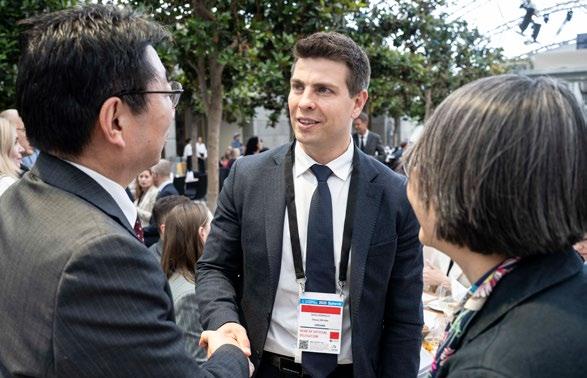
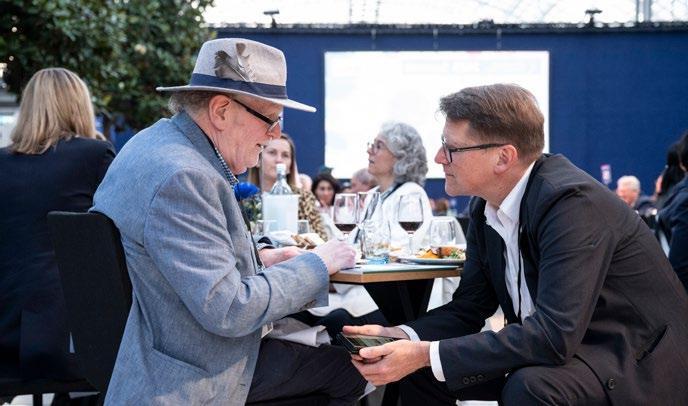
◀ The ITF’s Philippe Crist in conversation with transport journalist Peter Stoneham.
Philippe Crist, du FIT, s’entretient avec Peter Stoneham, journaliste spécialisé dans les transports.
▶ Korea’s Minister Sangwoo Park shakes hands with Germany’s State Secretary Claudia Stutz.
Le ministre coréen Sangwoo Park serre la main de la secrétaire d’État allemande Claudia Stutz.
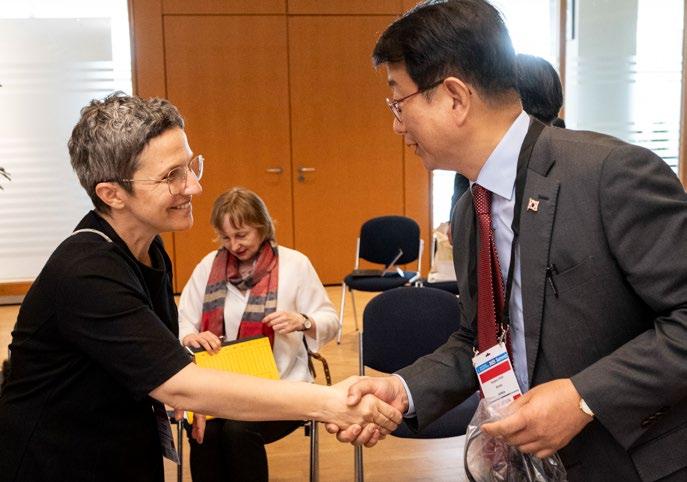

◀ Andrea Pizarro, Asian Infrastructure Investment Bank (AIIB), and Cambodia’s State Secretary Thun Yuthea Leng enjoy a relaxed moment.
Andrea Pizarro, de la Banque asiatique d’investissement pour les infrastructures (AIIB), et Thun Yuthea Leng, secrétaire d’État du Cambodge, profitent d’un moment de détente.
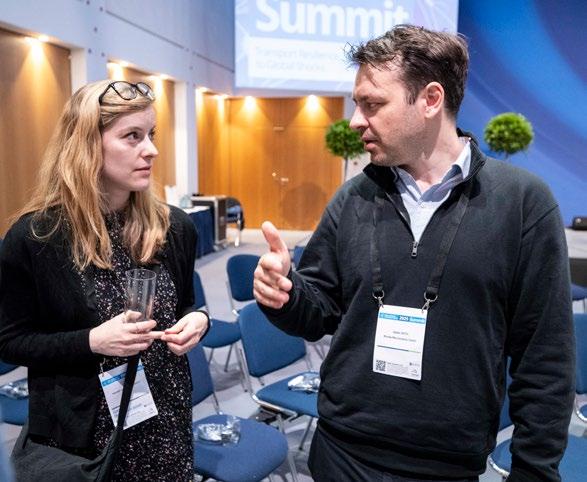
◀ Hannah Sudholt of ITF Corporate Partner Amazon and Stefan Räth of automotive supplier Mubea.
Hannah Sudholt d’Amazon, partenaire corporatif du FIT, et Stefan Räth de l’équipementier automobile Mubea.
▶ Irish Minister of State Seán Canney (left) and his delegation hold an informal meeting during the Summit.
Le ministre d’État irlandais Seán Canney (à gauche) et sa délégation tiennent une réunion improvisée pendant le Sommet.


◀ ITF Secretary-General Young Tae Kim shakes hands with China’s ViceMinister Chengguang Xu.
Le secrétaire général du FIT, Young Tae Kim, serre la main du vice-ministre chinois Chengguang Xu.
▶ Corporate Partnership Board members
Stefano Porro of Pirelli and Mario Tartaglia of FS Italiane in discussion at the Gala Dinner.
Stefano Porro de Pirelli et Mario Tartaglia de FS Italiane, membres du conseil de partenariat d’entreprise, en discussion lors du dîner de gala.


◀ Summit participants connect during a break between sessions.
Les participants du Sommet échangent pendant une pause entre les sessions.
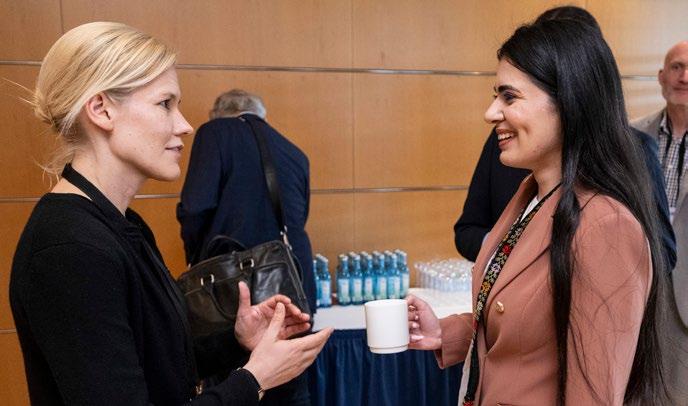
Riina Jussila, responsable du développement durable aux Nations unies à New York, s’entretient avec Sana’ Khasawneh, de Youth for Road Safety.
Sponsors & Partners

Arnault Mercier and Clémence Routhiau of ITF Corporate Partner Michelin pose in front of a display with the logos of ITF Corporate Partnership Board members.
Arnault Mercier et Clémence Routhiau de Michelin, partenaire corporatif du FIT, posent devant un présentoir avec les logos des membres du Conseil de partenariat corporatif du FIT.
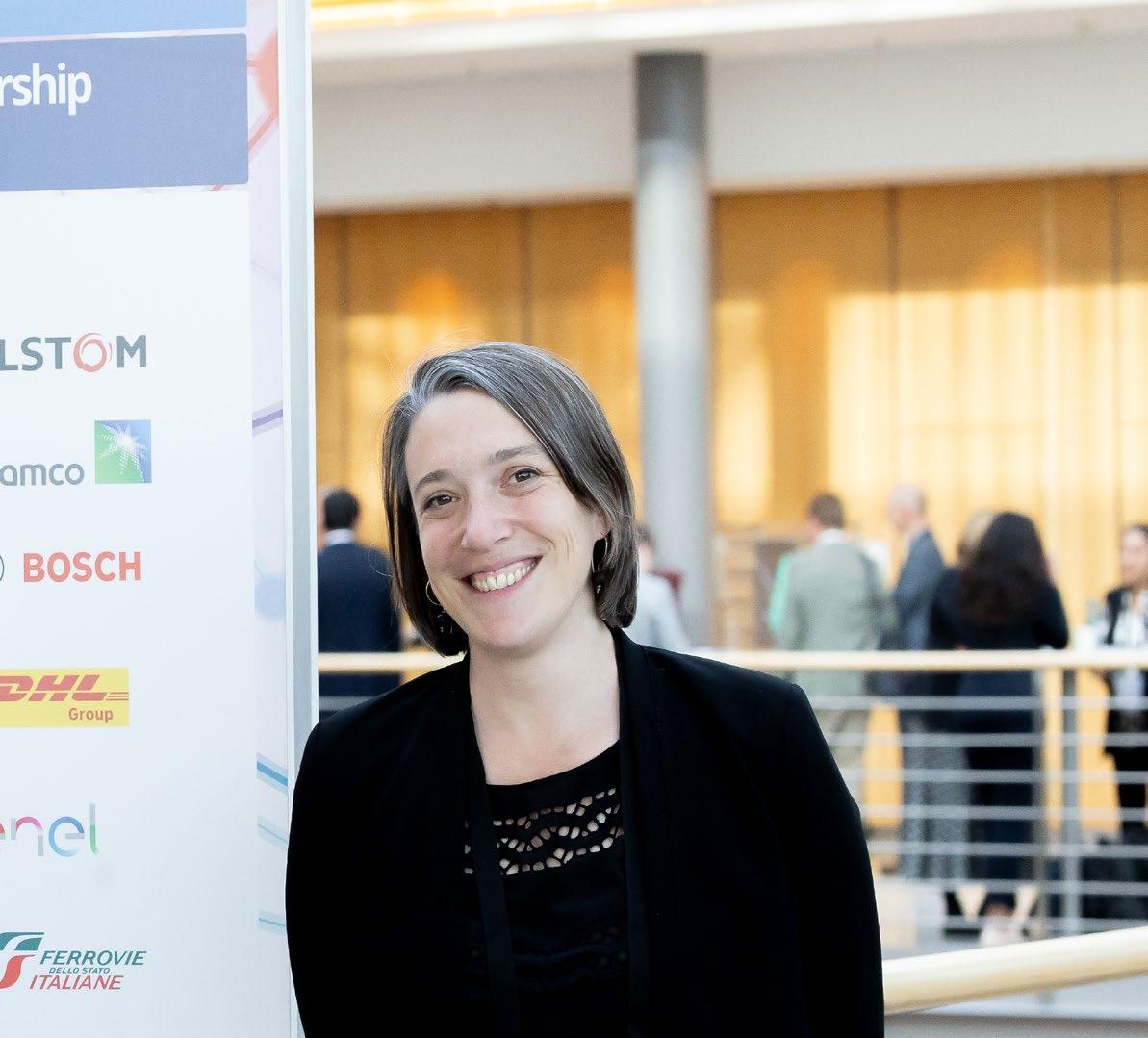
To build pandemic-resilient public transport, we must design more equitable and sustainable sources of financing.

▶ Regina Kraushaar, Minister of Infrastructure of Saxony, the Summit’s Regional Partner, welcomes delegates to the Gala Dinner.
Regina Kraushaar, ministre des Infrastructures de Saxe, partenaire régional du Sommet, accueille les délégués au dîner de gala.
Agustina Calatayud
Head of Transport Research, Innovation and Partnerships, Inter-American Development Bank
◀ Summit Diamond Sponsor EIT Urban Mobility showcased innovative urban mobility solutions from startups within its portfolio at the Open Stage Café.
Le sponsor diamant du sommet, EIT Urban Mobility, a présenté les solutions innovantes de mobilité urbaine proposées par des startups de son portefeuille lors de l’Open Stage Café.

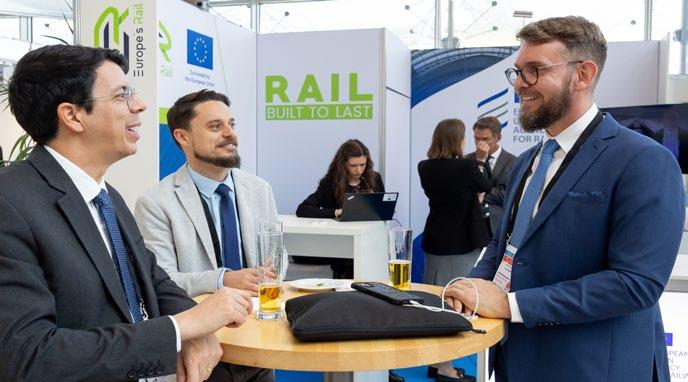
◀ Delegates at the stand of Summit Silver Sponsor EU Rail.
Délégués au stand du sponsor argent du Sommet, EU Rail.
▶ Radu Dinescu, President of Summit Diamond Sponsor IRU, opens the Official Side Event “A Brave New World: Can Transport Be Greener, More Resilient and More Competitive?”.
Radu Dinescu, président de l’IRU, sponsor diamant du Sommet, ouvre l’événement parallèle “Le meilleur des mondes : Les transports peuvent-ils être plus écologiques, plus résilients et plus compétitifs ?”
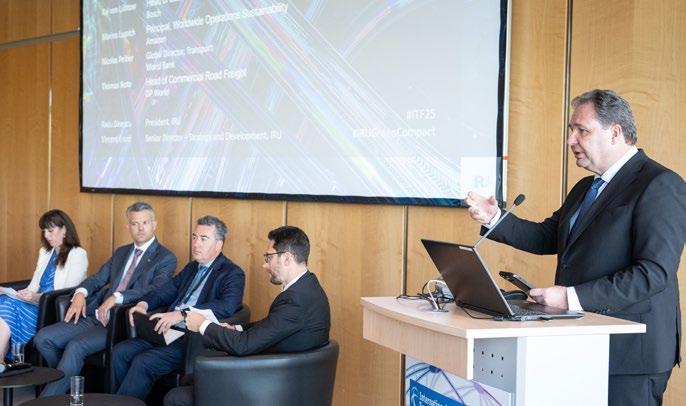

◀ Summit Mobility Partner Nextbike made the bicycle tour around Leipzig possible.
Nextbike, partenaire du Sommet pour la mobilité, a rendu possible la visite à vélo de Leipzig.
▶ Türkiye’s Deputy Minister Durmuş Ünüvar and Christoph Nolte, Executive Vice President of Summit Gold Sponsor Dekra, attend the Ministers’ Roundtable on Climate Change.
Le vice-ministre turc Ünüvar et Christoph Nolte, vice-président exécutif de Dekra, sponsor Gold du Sommet, assistent à la table ronde ministérielle sur le changement climatique.

First row:
1. Shaikh Abdulla bin Ahmed Al Khalifa, Minister of Transportation and Telecommunications, Bahrain
2. Thomas Danielsen, Minister for Transport, Denmark
3. Miri Regev, Minister of Transport and Road Safety, Israel
4. Andreas Carlson, Minister of Infrastructure and Housing, Sweden
5. Alenka Bratušek , Minister of Infrastructure, Slovenia
6. Eyjólfur Ármannsson, Minister of Infrastructure, Iceland
7. Patrick Schnieder, Federal Minister of Transport, Germany
8. Juan Carlos Muñoz, Minister of Transport and Telecommunications, Chile
9. Young Tae Kim, ITF Secretary-General
10. Rahman Hummatov, Deputy Minister of Digital Development and Transport, Azerbaijan
11. Saleh bin Nasser Al-Jasser, Minister of Transport, Saudi Arabia
12. Philippe Tabarot, Minister in charge of Transport, France
13. Lulu Ranne, Minister of Transport and Communications, Finland
14. Peter Hanke, Federal Minister of Innovation, Mobility and Infrastructure, Austria
15. Eugenijus Sabutis, Minister of Transport and Communications, Lithuania
Second row:
1. Tobias Meyer, DHL Group
2. Kees van der Burg, Vice-Minister for Mobility, Ministry of Infrastructure and Water Management, Netherlands
3. Armen Simonyan, Deputy Minister of Territorial Administration and Infrastructure, Armenia
4. Leng Thun Yuthea, Secretary of State, Ministry of Public Works and Transport, Cambodia
5. Seán Canney, Minister of State in the Department of Transport, Ireland
6. Pablo Camacho Salazar, Vice-Minister of Infrastructure, Costa Rica
7. Tatiana Molcean, Executive Secretary, UNECE
8. Yoshimichi Terada, Vice-Minister for International Affairs, Ministry of Land, Infrastructure, Transport and Tourism, Japan
9. Cecilie Knibe Kroglund, State Secretary in the Ministry of Transport, Norway
10. Serhiy Derkach, Deputy Minister of Communities, Territories and Infrastructure Development, Ukraine
11. Joseph Bukari Nikpe, Minister of Transport, Ghana
12. Stanisław Bukowiec, Secretary of State in the Ministry of Infrastructure, Poland
13. Durmuş Ünüvar, Deputy Minister of Transport and Infrastructure, Türkiye
14. Denisa Žiláková, State Secretary at the Ministry of Transport, Slovakia
15. Dimitar Nedyalkov, Deputy Minister of Transport and Communications, Bulgaria
16. H.E. Eng Khamis Mohammed Al-Shamakhi, Undersecretary of the Ministry of Transport, Oman
17. Nicolai Mîndra, State Secretary of the Ministry of Infrastructure and Regional Development, Moldova
18. Guangzhe Chen, The World Bank
19. Machteld de Haan, Shell
Third row:
1. Karl-Johan Runnberg, Volvo Group
2. Tomás Serebrisky, IDB
3. Seokwoo Lee, Autocrypt
4. Craig Hutton, Transport Canada
5. Sara Elkady, Siemens Mobility
6. Pierre-Martin Huet, Michelin
▼ From left to right
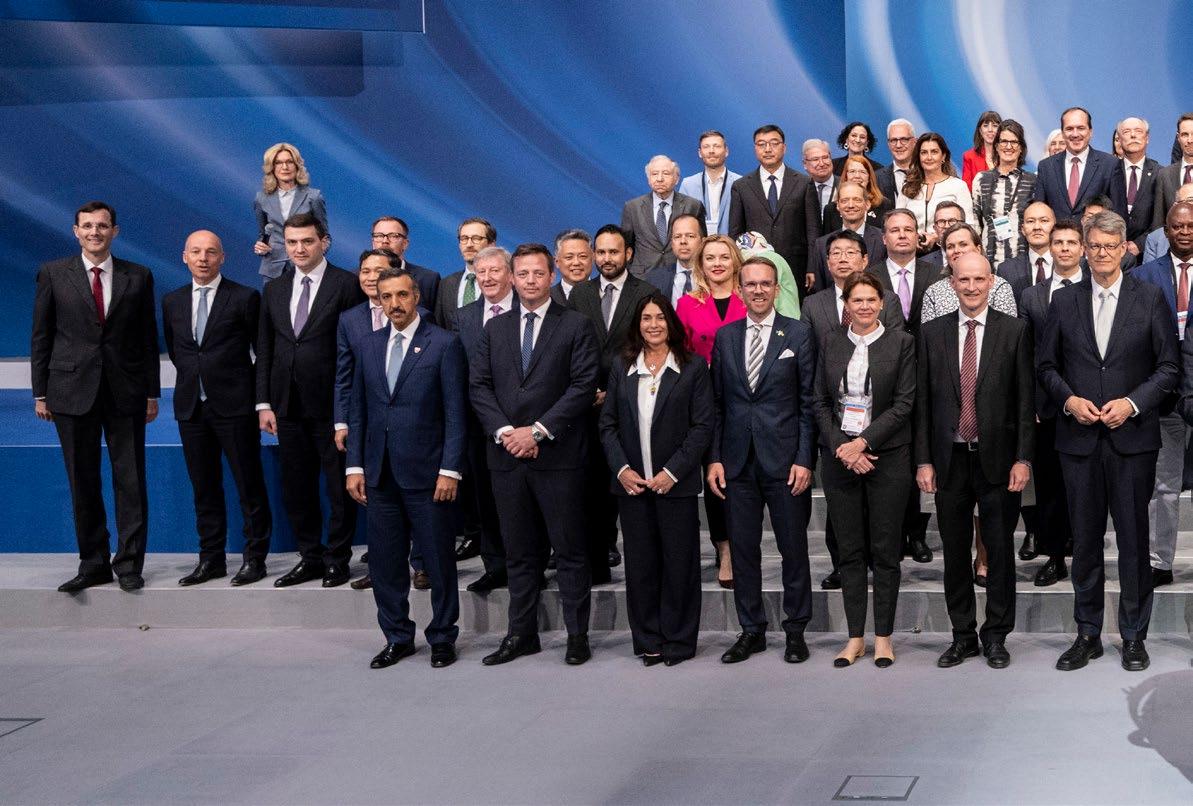
7. Radu Dinescu, IRU
8. Patrick Malléjacq, PIARC
9. Asset Assavbayev, TRACECA
10. Hiroaki Yamaguchi
11. Djamel Eddine Abdelghani, Ministry of Public Works and Transport, Algeria
12. Christoph Nolte, Dekra Group
13. Jean-Luc Chapoton, RATP
14. Yumi Otsuka, Toyota Motor Corporation
15. Michael Peter, Siemens Mobility
16. Despoina Paliarouta, Ministry of Infrastructure and Transport, Greece
17. Umberto De Pretto, IRU
18. Lucie Anderton, UIC
19. Philippe Delleur, Alstom
20. Sander Salmu, Ministry of Climate, Estonia
21. Lazăr Comănescu, BSEC
22. Sarquis J. B. Sarquis, Permanent Representative of Brazil to the International Economic Organisations in Paris
23. Aleksandr Kuzmenko, OTIF
24. Victoria Sheehan, Transportation Research Board
25. Claudia Pizarro, Mayor of La Pintana, Chile
26. Abdalla Al-Hamar, Ambassador of the State of Qatar to Germany
Fourth row:
1. Jean Todt, United Nations Special Envoy for Road Safety
2. Tao Wang, CATS
3. Jill Warren, ECF
4. Susanna Zammataro, IRF
5. Bronwen Thornton, Walk21 Foundation
6. Roland Werner, Uber
7. Mirosław Antonowicz, OSJD
8. Silvio Birindelli, Bosch
9. Nannette Lafond-DuFour, Women’s Forum
10. Rocío Báguena, Ministry for Transport and Sustainable Mobility, Spain
11. Caroline Alméras, ECTRI
12. Nicolette van der Jagt, CLECAT
13. João Caetano, Portuguese Institute for Mobility and Transport
14. Sophie de Richecour, Total Energies
15. Stephen Cotton, International Transport Workers’ Federation
16. Thomas de Boer, Shell
Fifth row:
1. Sebastian Langer, Saxon Ministry for Infrastructure and Regional Development, Germany
2. Francisco Esteban Lefler, PIANC
3. Miryam Saade, UN-ECLAC
4. Stefano Bonardi, Pirelli
5. Seizo Onoe, ITU
6. Marina Lussich, Amazon
7. Donatella Orlandi, Ministry of Infrastructure and Transport, Italy
8. Julie Abraham, Department of Transportation, United States
9. Kornél Kovács, Ministry of Construction and Transport, Hungary
10. Mandiaye Faye, Minister of Land Transport, Senegal
11. Jane Peters, Department for Transport, United Kingdom
12. David Sutton, Ministry for Transport, Infrastructure and Capital Projects, Malta
13. Sebastian Hirsz, BP
14. Aleksandra Suladze, Ministry of Economy and Sustainable Development, Georgia
15. Karen Vancluysen, POLIS
16. Bernadette Bergsma, EIT Urban Mobility
17. Andrés Pizarro, AIIB
18. Isabel Gómez, Iberdrola
19. Mario Tartaglia, FS Italiane
20. Abdellah Mohamedou, Ministry of Equipment and Transport, Mauritania
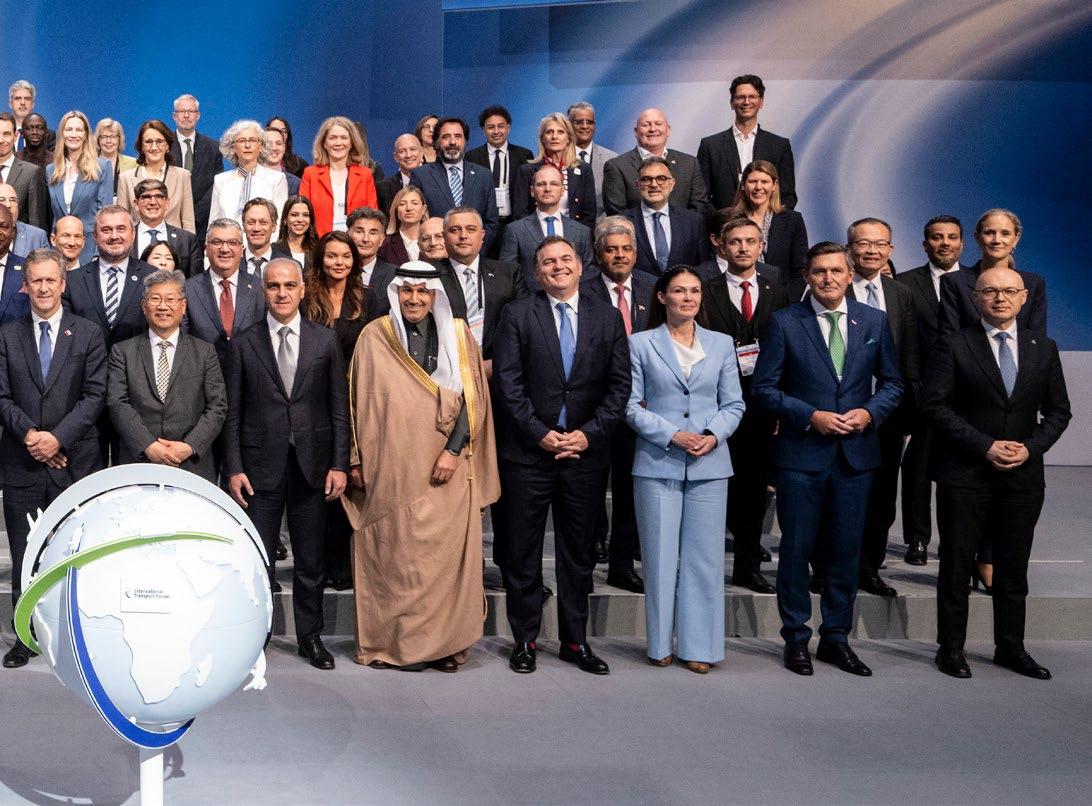
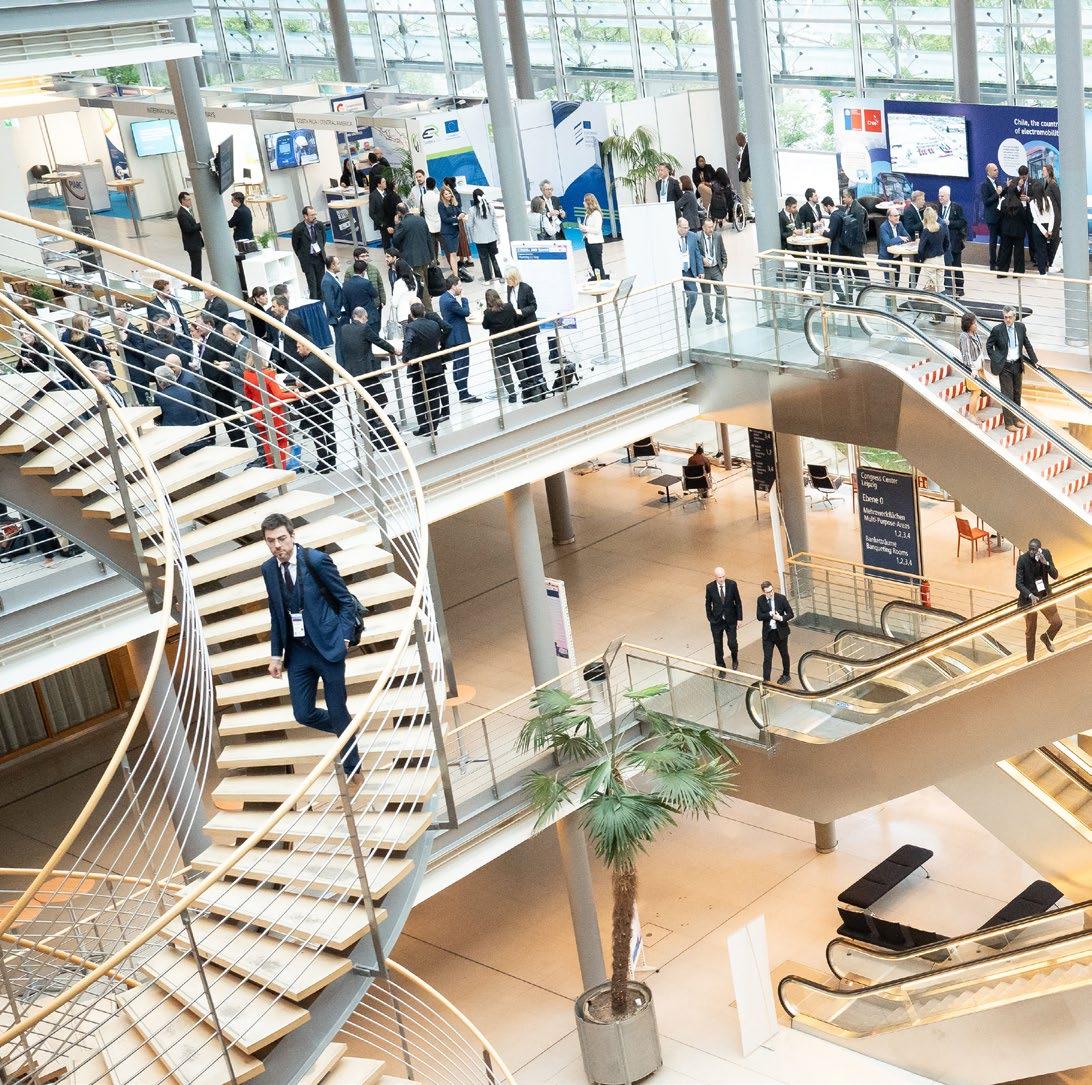
Exhibition & Side Events

Member countries, corporate partners and stakeholders from the gLobal transport community contributed to the diverse Summit offers and activities.
Les pays membres, les partenaires industriels et les parties prenantes de la communauté mondiale des transports ont contribué à la diversité des offres et des activités du Sommet.
If we want to achieve structural transformation in resilience, it requires robust Public-Private Partnership frameworks.
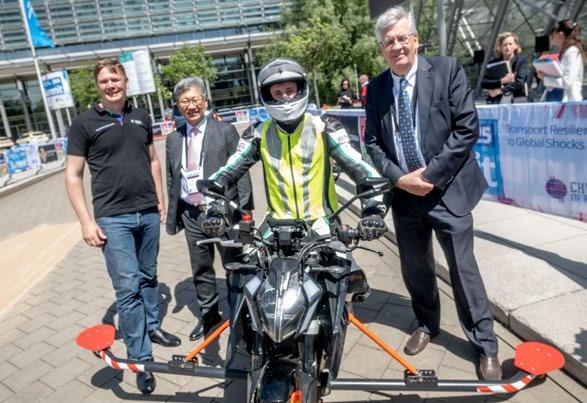
▶ Chile’s Summit team at the ITF Presidency country’s exhibition stand.
L’équipe du Chili, pays assurant la présidence du FIT, à leur stand d’exposition durant le Sommet.
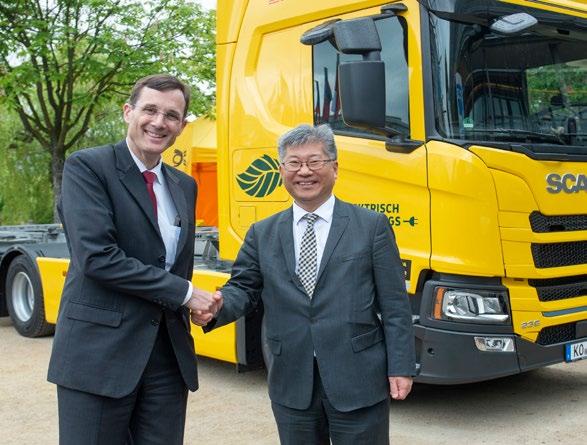
Anne-Lise Coeur-Bizot Head of Crisis Management and Preparedness, RATP Group
◀ ITF Secretary-General Young Tae Kim (second from left) and Global NCAP president emeritus David Ward (right) attend a demonstration of automated emergency braking technology for motorcycles.
Le Secrétaire général du FIT, Young Tae Kim (deuxième à partir de la gauche), et le président émérite du Global NCAP, David Ward (à droite), assistent à une démonstration de la technologie de freinage d’urgence automatisé pour les motos.

◀ Tobias Meyer, CEO of ITF Corporate Partner DHL Group, welcomes ITF Secretary-General Kim to DHL’s new EREV truck, on display outside the conference centre. Tobias Meyer, PDG du groupe DHL, partenaire du FIT, accueille Young Tae Kim Kim, Secrétaire général du FIT, dans le nouveau camion EREV de DHL, exposé à l’extérieur du centre de conférence.
▶ A vehicle testing point outside the Summit venue showcased by The Real Urban Emissions initiative, (TRUE) a project of the FIA Foundation.
Un lieu d’essai de véhicules à l’extérieur du complexe du Sommet, présenté par l’initiative « Real Urban Emissions » (TRUE), un projet de la Fondation FIA.
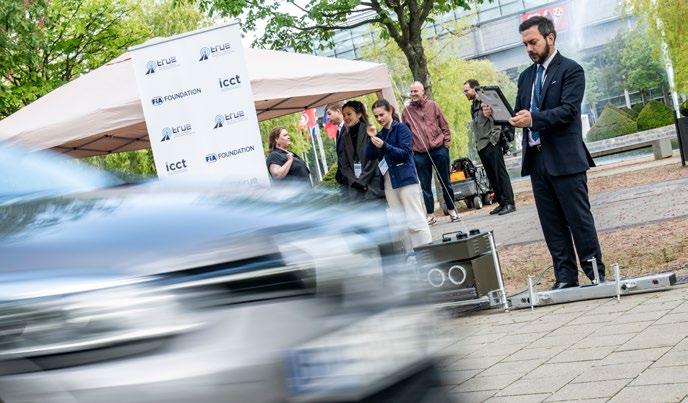

◀ Federal Minister Patrick Schnieder enjoys a technology demonstration at the German stand.
Le ministre fédéral Patrick Schnieder assiste à une démonstration technologique sur le stand allemand.
▶ Paula Boecken (r.) of ITF Corporate Partner Uber moderating the Official Side Event “One less car” with speakers from POLIS, UITP, the Global Network for Popular Transportation and the City of Leipzig.
Paula Boecken (à droite) d’Uber, partenaire du FIT, animant l’événement parallèle « Une voiture de moins » avec des intervenants de Polis, de l’UITP, du Réseau mondial pour les transports populaires et de la ville de Leipzig.
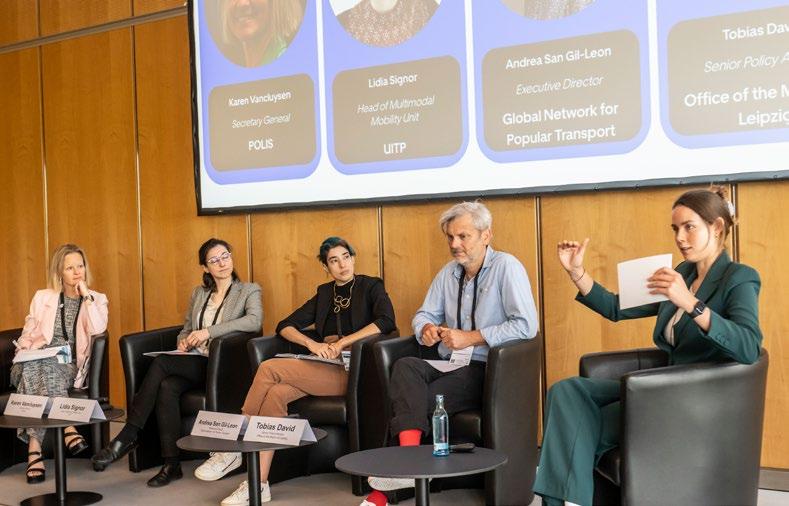
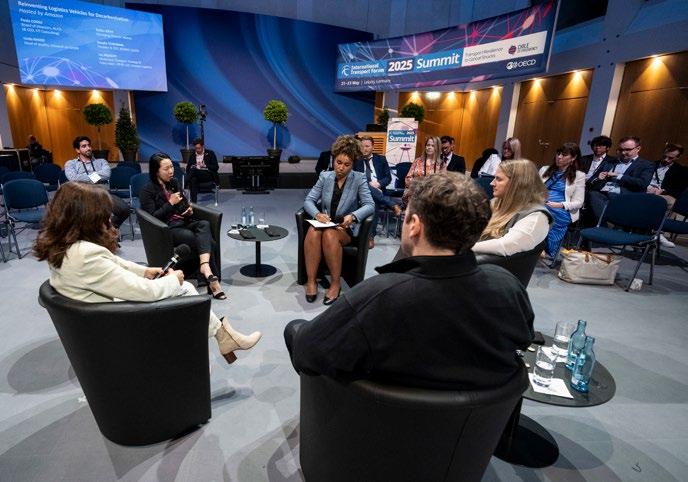
◀ An Official Side Event organised by ITF Corporate Partner Amazon explored the potential of cargo bikes pushcarts and other last-mile, low-emissions delivery solutions.
Un panel organisé par Amazon, partenaire corporatif du FIT, a exploré le potentiel des véloscargos, des chariots et autres solutions de livraison à faible émission pour le dernier kilomètre.
▶ French Minister
Philippe Tabarot hosted a discussion with ITF Corporate Partnership Board members from France at his ministry’s exhibition stand.
Le ministre français
Philippe Tabarot a organisé une discussion avec les membres français du Conseil de partenariat avec les entreprises du FIT sur le stand d’exposition de son ministère.
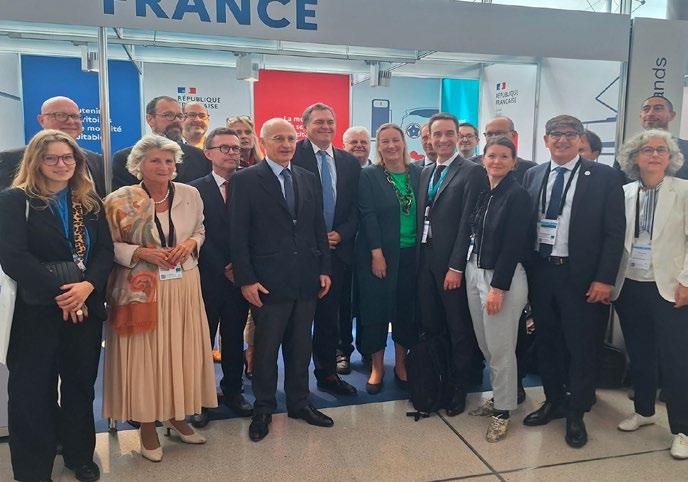

◀ Phoebe Stockton of the Air Quality Team of the Greater London Authority (UK) makes a point during a side event on using data to reduce non-exhaust emissions in cities.
Phoebe Stockton, de l’équipe chargée de la qualité de l’air au sein de l’Autorité du Grand Londres (UK), fait une remarque lors d’un événement parallèle sur l’utilisation des données pour réduire les émissions non polluantes dans les villes.

▶ Japan’s Ministry of Land, Infrastructure, Transport and Tourism (MOLIT) hosted an Official Side Event on connectivity and diversification in the context of transport system resilience.
Le ministère japonais de l’aménagement du territoire, des infrastructures, des transports et du tourisme (MOLIT) a organisé un événement parallèle officiel sur la connectivité et la diversification dans le contexte de la résilience du système de transport.
◀ Anja Link, HSBC’s Head of Sustainability
Commercial Banking and Thomas de Boer, Vice-President Renewable Natural Gas of Shell, discuss the “bioenergy trilemma”: decarbonisation, scalability, affordability. Anja Link, responsable du développement durable au sein de la banque commerciale de HSBC, et Thomas de Boer, viceprésident chargé du gaz naturel renouvelable chez Shell, discutent du « trilemme de la bioénergie » : décarbonisation, évolutivité, accessibilité financière.
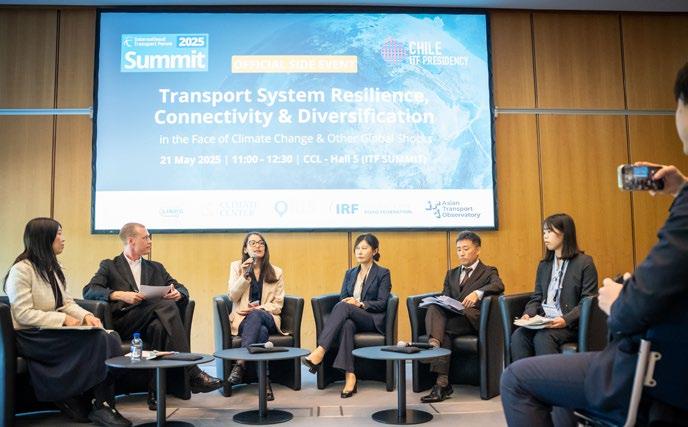

◀ Adriana Diaz, Director of Innovation at EIT Urban Mobility, intervenes during a side event on digital infrastructure for resilient supply chains organised by France and the Netherlands.
Adriana Diaz, directrice de l’innovation à l’EIT Urban Mobility, intervient lors d’un événement parallèle sur l’infrastructure numérique pour des chaînes d’approvisionnement résilientes organisé par la France et les Pays-Bas.
ITF Secretary-General Young Tae Kim answers questions from journalists during a free moment at the ITF stand.
Le secrétaire général du FIT, Young Tae Kim, répond aux questions des journalistes lors d’un moment de détente au stand du FIT.
Media

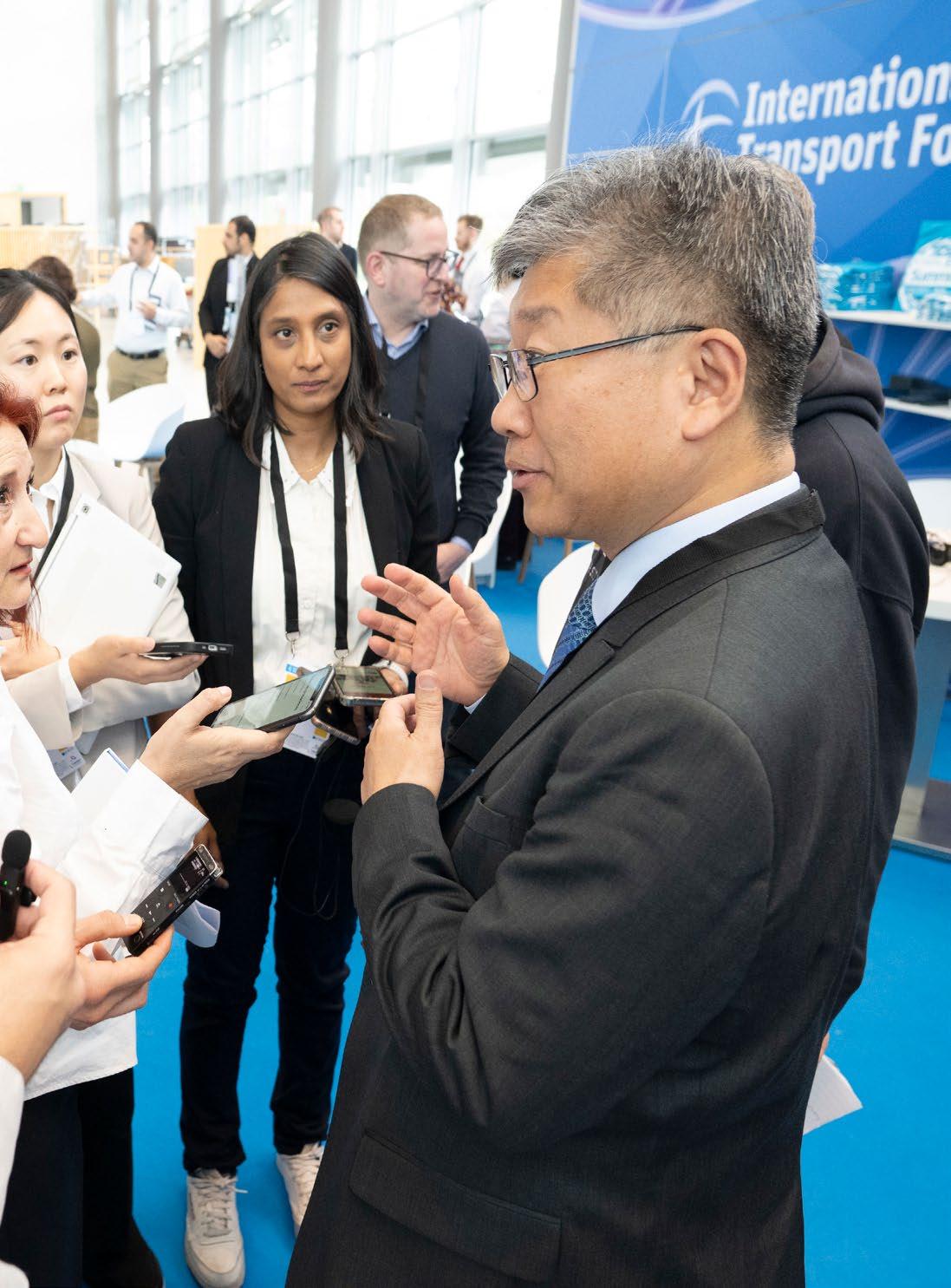
Resilience is not only about recovery. It includes anticipation, preparation and responsiveness.
▶ Juan Carlos Muñoz, Chile’s Minister of Transport and Telecommunications, addresses journalists during the Opening Press Conference.
Juan Carlos Muñoz, ministre chilien des Transports et des Télécommunications, s’adresse aux journalistes lors de la conférence de presse d’ouverture.

Juan Carlos Muñoz Minister of Transport and Telecommunication, Chile

◀ The BBC invited President Juan Carlos Muñoz to be interviewed about the Summit by Sally Bundick on the World Business Report.
Sally Bundick de la BBC a interviewé le président Juan Carlos Muñoz sur sa participation au Sommet pour son émission World Business Report.
▶ Moroccan news media interview ITF Secretary-General Young Tae Kim.
Les médias marocains interviewent Young Tae Kim, secrétaire général du FIT.
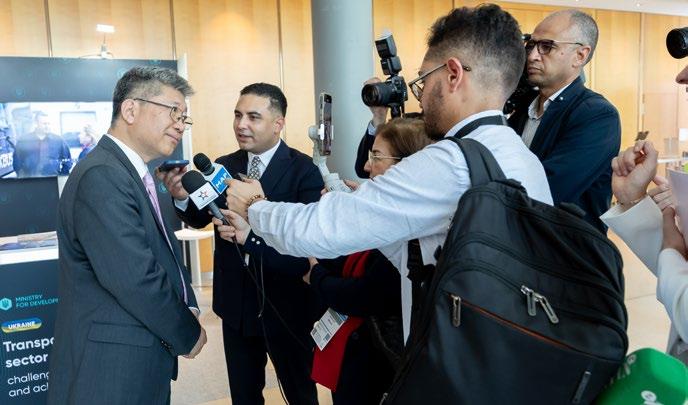

▶ Azerbaijan’s Deputy Minister Rahman Hummatov, ITF
Secretary-General Young Tae Kim and Chile’s Minister Juan Carlos Muñoz (from left to right) celebrate the handover of the ITF Presidency from Chile to Azerbaijan for the year 2025/26.
Le Vice-ministre azerbaïdjanais Rahman Hummatov, le Secrétaire général du FIT Young Tae Kim et le Ministre chilien Juan Carlos Muñoz (de gauche à droite) célèbrent la passation de la présidence du FIT du Chili à l’Azerbaïdjan pour l’année 2025/26.
◀ Journalists receive an update on active travel policies from the Partnership for Active Travel and Health (PATH) during a Summit “Media Moment”.
Des journalistes reçoivent une mise à jour sur les politiques de déplacement actif de la part du Partenariat pour les déplacements actifs et la santé (PATH) au cours d’un « Point média » au sommet.

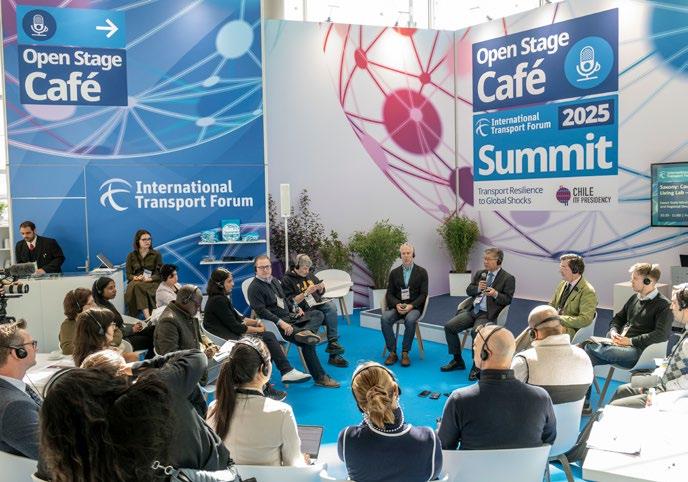
◀ Media briefing for international journalists at the Open Stage Café with ITF
Secretary-General Young Tae Kim.
Séance d’information pour les journalistes internationaux à l’« Open Stage Café » avec le Secrétaire général du FIT, Young Tae Kim.
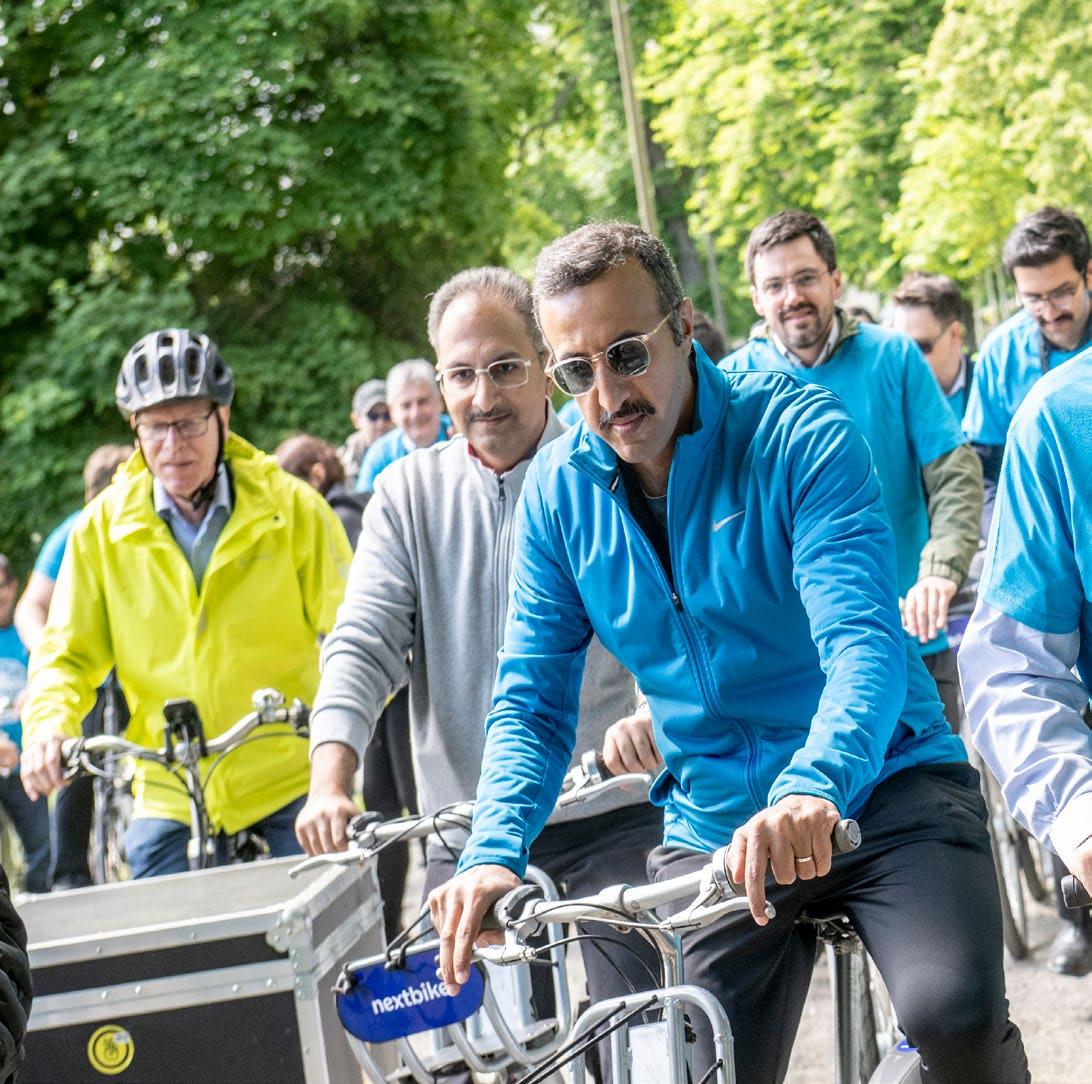
Bicycle Tour

Ministers, VIPs and Summit participants from around the world discovered the Summit host city from their saddles on the final day of the Summit.
Ministres, VIPs et des participants venus du monde entier ont découvert la ville d’accueil du Sommet depuis leurs vélos le dernier jour du Sommet.
The origin of a crisis doesn’t matter. It’s how we manage the consequences that counts.
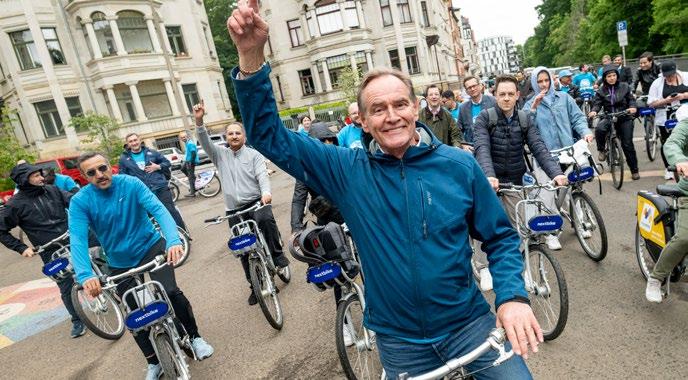
Billy Hann Chief Executive Officer, Dublin Bus
◀ Lord Mayor Burkhard Jung led the traditional bike tour around Leipzig.
Le maire Burkhard Jung a dirigé le traditionnel tour à vélo autour de Leipzig.
▶ Bahrain’s Minister of Transport and Telecommunications, Sheikh Abdullah bin Ahmed Al Khalifa joined the bicycle tour of Leipzig.
Le ministre des Transports et des Télécommunications de Bahreïn, Sheikh Abdullah bin Ahmed Al Khalifa, s’est joint au tour cycliste de Leipzig.


◀ Changeable weather did not stop Summit participants from exploring Leipzig on bicycles.
Le mauvais temps n’a pas empêché les participants du Sommet d’explorer Leipzig à vélo.
▼ Leipzig’s 600 000 inhabitants benefit from lots of green space, and so did the Summit cyclists.
Les 600 000 habitants de Leipzig bénéficient de nombreux espaces verts, tout comme les cyclistes du Sommet.

▶ A well-deserved break with food, drinks and information on Leipzig’s urban development plans.
Une pause bien méritée avec de la nourriture, des boissons et des informations sur les plans de développement urbain de Leipzig.
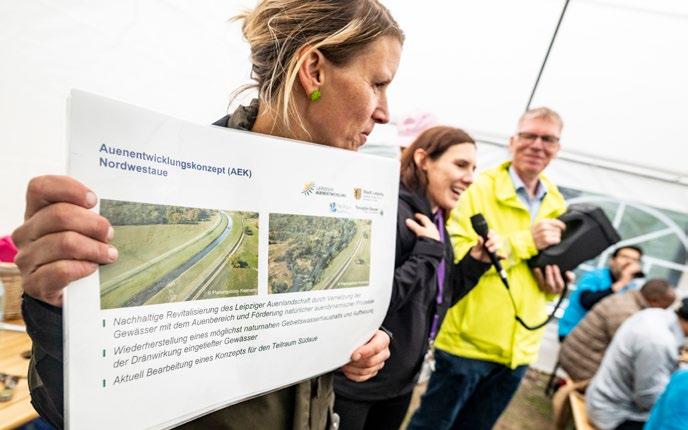

◀ Mayor Jung poses with fellow cyclists Minister Al Khalifa (Bahrain, left) Minister Muñoz (Chile, second from right) and Salvador Saavedra, Mexico.
Le maire Jung pose avec ses collègues cyclistes, le ministre Al Khalifa (Bahreïn, à gauche), le ministre Muñoz (Chili, deuxième à partir de la droite) et Salvador Saavedra (Mexique).
Impact

Marking a historic first for the International Transport Forum, the Council of Ministers of Transport adopted two landmark policy recommendations on the responsible use of artificial intelligence in transport and on improving road safety.
Marquant une première historique pour le Forum International des Transports, le Conseil des ministres des transports a adopté deux recommandations politiques majeures relatives à l’utilisation responsable de l’intelligence artificielle dans les transports et à l’amélioration de la sécurité routière.
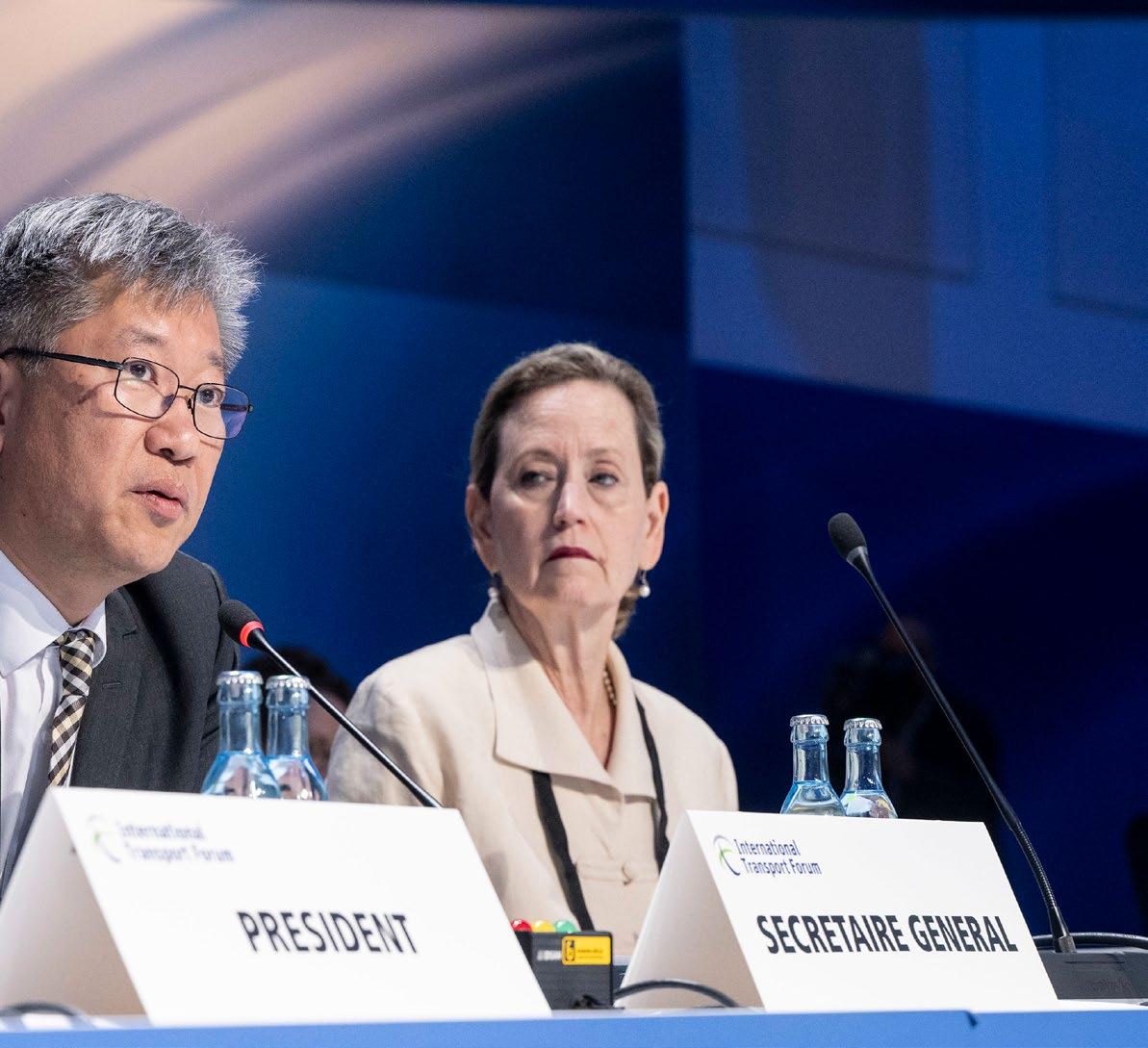
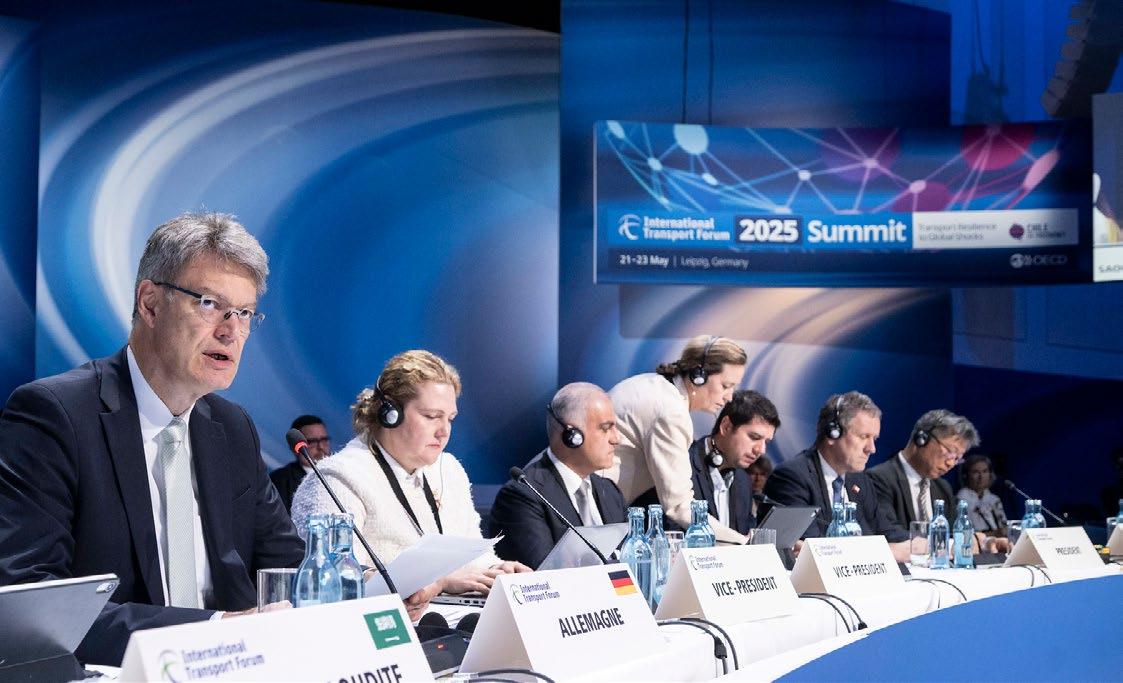

ITF Policy Recommendations
Recommandations politiques du FIT
ITF Policy Recommendation
Concerning the Use of Artificial Intelligence by Transport Authorities
This ITF policy recommendation sets out strategic guidance for transport authorities on the responsible use of artificial intelligence (AI) in the context of transport. It promotes AI adoption in policymaking, and service delivery, while emphasising risk management, transparency, and ethical governance. The document highlights four key actions for transport authorities: oversight stewardship, inventory of AI use cases, structured risk assessment, and capacity-building. It calls for cross-sector collaboration to ensure AI systems support human rights, safety, and public trust in transport systems.
ITF Policy Recommendation on Comprehensive Road Safety Policy
This ITF Policy Recommendation provides guidance for policy makers for developing tailored, contextspecific road safety policies that effectively reduce fatalities and serious injuries across all regions. It promotes the Safe System approach, advocating for comprehensive, evidence-based strategies that address infrastructure, vehicles, traffic management, and user behaviour. Key pillars include strengthening data systems, prioritising high-impact interventions, managing speed, supporting safe behaviour, accelerating the deployment of vehicle safety technologies, engaging the corporate sector, and fostering crossgovernment co-ordination.
Recommandations politiques du FIT concernant l’utilisation de l’intelligence artificielle par les autorités de transport

◀ Read the full texts Lire les textes complets
Cette recommandation politique du FIT définit des orientations stratégiques pour les autorités de transport sur l’utilisation responsable de l’intelligence artificielle (IA) dans le contexte du transport. Elle encourage l’adoption de l’IA dans l’élaboration des politiques, les opérations et la prestation de services, tout en mettant l’accent sur la gestion des risques, la transparence et la gouvernance éthique. Le document met en évidence quatre actions clés pour les autorités de transport : gestion de la surveillance, inventaire des cas d’utilisation de l’IA, évaluation structurée des risques et renforcement des capacités. Il appelle à une collaboration intersectorielle pour garantir que les systèmes d’IA soutiennent les droits de l’homme, la sécurité et la confiance du public dans les systèmes de transport.
Recommendation politique du FIT sur une politique globale de sécurité routière
Cette recommandation politique du FIT fournit des conseils aux décideurs politiques pour développer des politiques de sécurité routière adaptées et spécifiques au contexte afin de réduire efficacement le nombre de tués et de blessés graves dans toutes les régions. Elle promeut l’approche « Système sûr », en préconisant des stratégies globales, fondées sur des données probantes, portant sur l’infrastructure, les véhicules, la gestion du trafic et le comportement des usagers. Les principaux piliers comprennent le renforcement des systèmes de données, la priorisation des interventions à fort impact, la gestion de la vitesse, le soutien des comportements sûrs, l’accélération du déploiement des technologies de sécurité des véhicules, l’engagement du secteur des entreprises et la promotion de la coordination entre les gouvernements.
Le Sommet 2025 en rétrospective
Débats et décisions
Saisir toute la portée d’un événement aussi dynamique que le Sommet 2025 n’est pas chose aisée. Le programme fournit une structure et une orientation, mais les moments qui se déroulent en son sein sont d’une grande valeur. Une idée inattendue lors d’une table ronde. Un thème récurrent qui apparaît au fil des sessions. Une conversation informelle entre participants qui se transforme en une collaboration durable.
Cette brochure rassemble les points forts visuels du Sommet 2025 du Forum International des Transports, qui s’est tenu du 21 au 23 mai à Leipzig sur le thème “La résilience des transports face aux chocs mondiaux”. Elle présente un compte rendu visuel des réunions de haut niveau et des rencontres informelles, des débats animés et des démonstrations en direct et, surtout, des personnes qui y ont participéministres, dirigeants, experts et tous les partenaires qui travaillent avec le FIT pour aider à façonner l’avenir des transports.
Le Sommet a pris des mesures importantes dans ce sens. L’organe décisionnel le plus élevé du FIT, le Conseil des ministres des transports, a approuvé des recommandations politiques historiques. La première recommandation de politique générale du FIT fournit aux gouvernements des orientations pour l’utilisation responsable de l’intelligence artificielle dans les transports. La deuxième recommandation énonce les
principes des politiques de sécurité routière qui permettent de sauver des vies. Vous pouvez en savoir plus sur ces recommandations aux pages 46-47.
En tant que résultats tangibles du Sommet 2025, ces documents donnent une orientation à la gouvernance mondiale des transports sur des questions essentielles. Ils sont le fruit d’une collaboration inlassable entre nos pays membres et reflètent à la fois le sérieux de notre mission et la vitalité de notre collaboration.
La force du Sommet du FIT réside dans sa diversité. Nous avons eu l’honneur d’accueillir des délégations de plus de 70 nations. Plus de 40 ministres et vice-ministres ont participé au Sommet du FIT en 2025. Les organisations internationales, les banques multilatérales de développement, les partenaires du secteur privé et les leaders d’opinion universitaires ont apporté une profondeur et une nuance essentielles. La présence d’environ 70 représentants des médias du monde entier a permis à nos discussions de trouver un écho bien au-delà des murs du centre de conférence.
Je tiens à exprimer ma profonde gratitude à la République du Chili, qui a assuré la présidence du FIT en 2024/25, pour avoir dirigé notre organisation de manière aussi exemplaire. La clarté calme du ministre Juan Carlos Muñoz a piloté le Forum tout au long d’une année où la résilience était une qualité
essentielle pour la gouvernance autant que pour les systèmes de transport. Je me réjouis de collaborer avec l’Azerbaïdjan lorsqu’il assumera la présidence du FIT pour 2025-2026 ; son solide bilan dans les enceintes multilatérales me donne toute confiance que le Forum sera entre de bonnes mains.
Je tiens également à remercier sincèrement nos partenaires et sponsors qui ont permis au Sommet 2025 de prospérer : l’État libre de Saxe, l’Union internationale des transports routiers (IRU), l’EIT Urban Mobility, Dekra, EU Rail et Nextbike.
Préparer les systèmes de transport à relever les défis d’une incertitude croissante et de risques de plus en plus importants est une tâche gigantesque. J’ai quitté Leipzig avec le sentiment que ce sommet a permis de faire un grand pas en avant vers la résilience des transports. Mais nous savons tous que cela ne se fera pas du jour au lendemain, et c’est pourquoi 2025 était le premier d’une trilogie sur le sujet.
Notre voyage se poursuivra l’année prochaine, du 6 au 8 mai 2026, avec pour thème « Financer des transports résilients ». D’ici là, je vous invite à revisiter les personnes, les moments et les résultats du Sommet 2025 dans les pages qui suivent, et à porter ses idées dans le travail à venir.
Young Tae Kim Secrétaire général
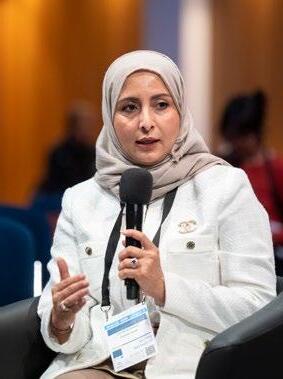

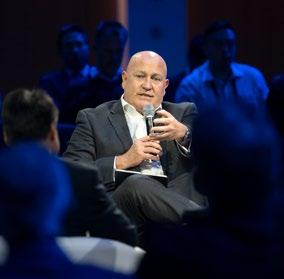
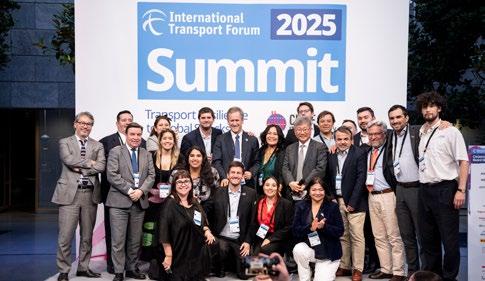












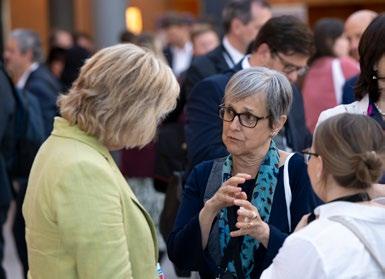

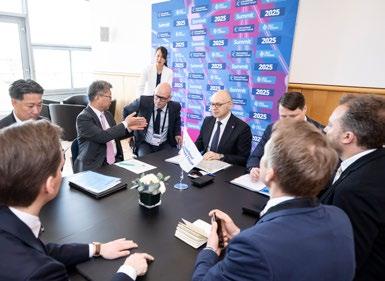
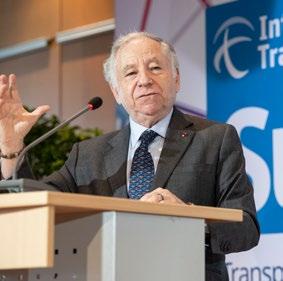
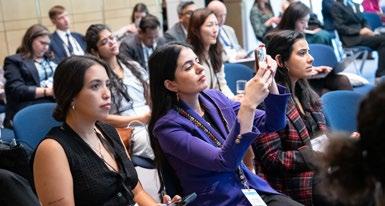
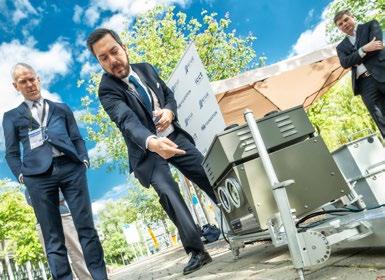


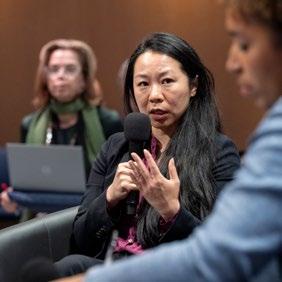

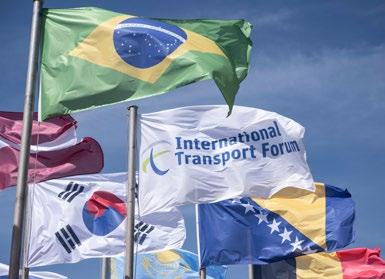


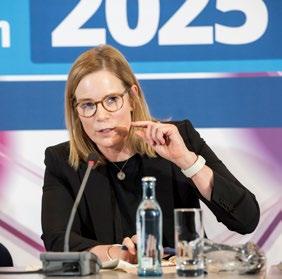

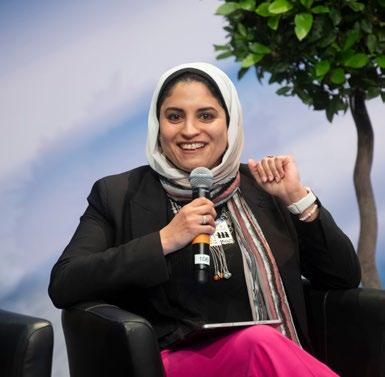



International Transport Forum
2, rue André Pascal
75775 Paris Cedex 16
France
www.itf-oecd.org
HIGHLIGHTS IN PICTURES
The Summit of the International Transport Forum (ITF) is the largest gathering of transport ministers and the world’s premier transport policy event.
Themed "Transport Resilience to Global Shocks", the 2025 Summit under the Presidency of Chile brought more than 1200 participants and more than 40 ministers and vice-ministers to Leipzig, Germany from 21 to 23 May 2025.
This brochure captures key moments, important outcomes and the breadth and diversity of three days of high-level policy debate and networking in pictures.
